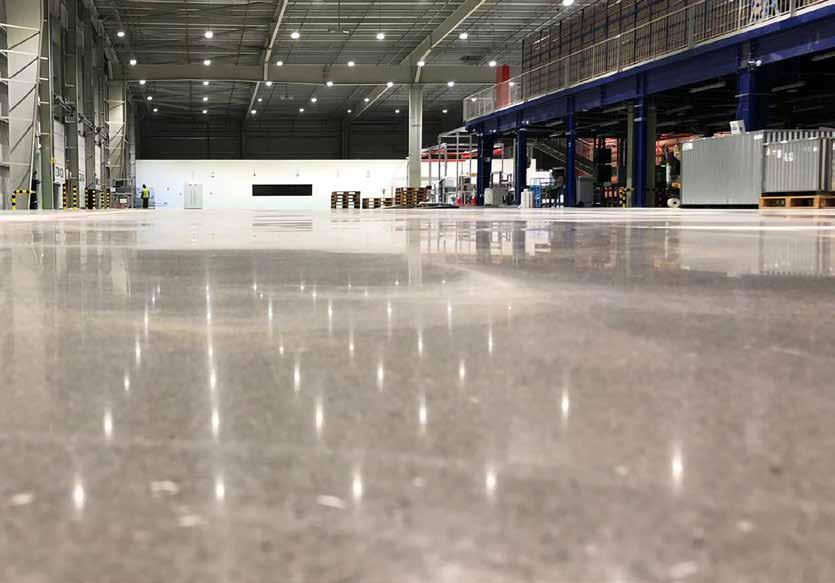






Full offering
- Full range vehicles with the most advanced technologies
- Highly customized product driven by market needs and optimized Total Cost of Ownership
High capillarity of aftersales
- Repair and Maintenance contracts and competitive warranty conditions
- Origin 100% IVECO Parts and a widespread network coverage
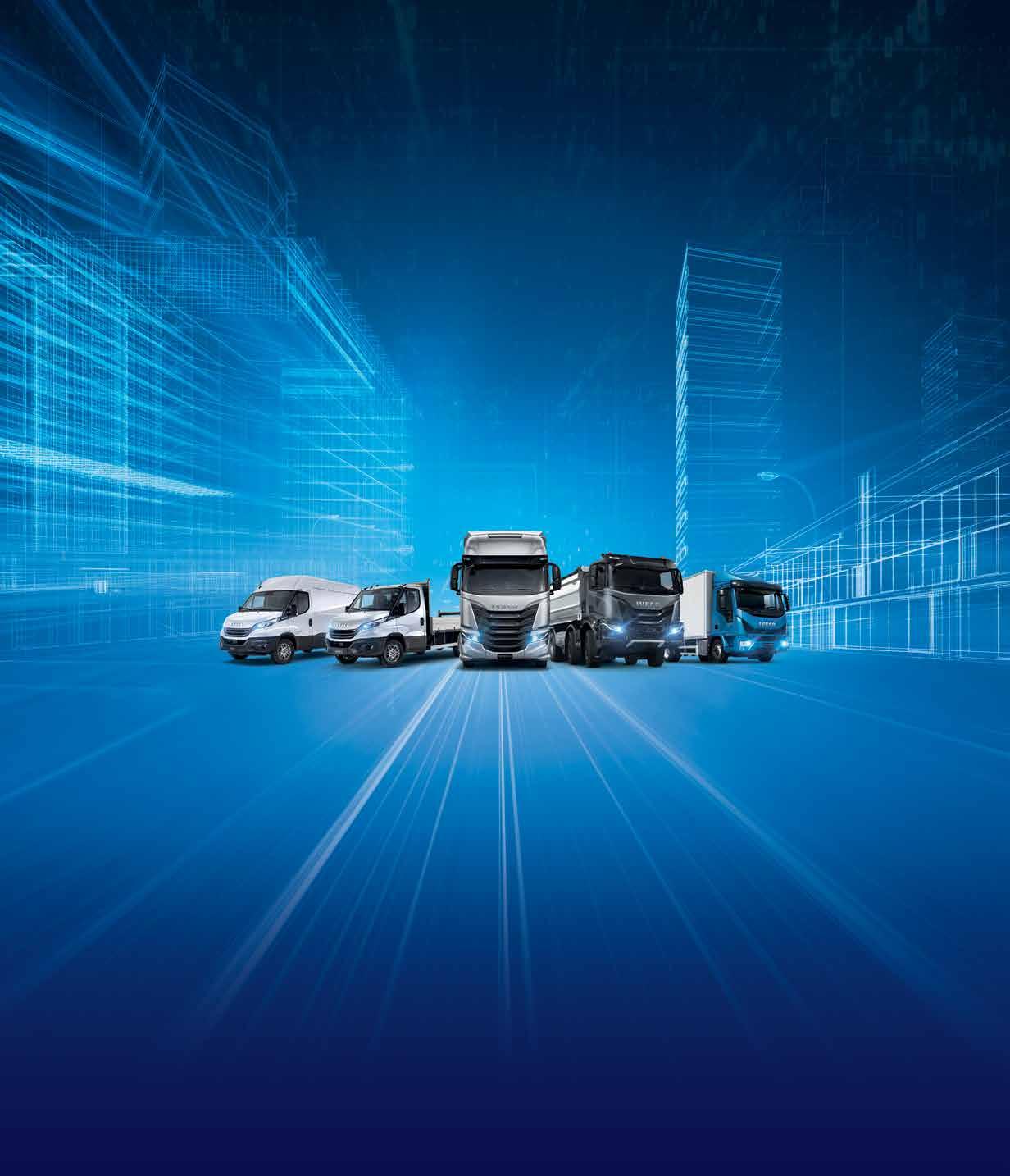
European technology
- High quality complete line-up in terms of tonnage, power, torque, safety, ergonomics
- High performance and robust trucks for extreme Off-road conditions
Customer centricity
- Comfort, ergonomics and the latest safety technology to make on board easier
- Driver Style Evaluation tool on Heavy ON-road range and optimized vehicle design to improve customer profitability
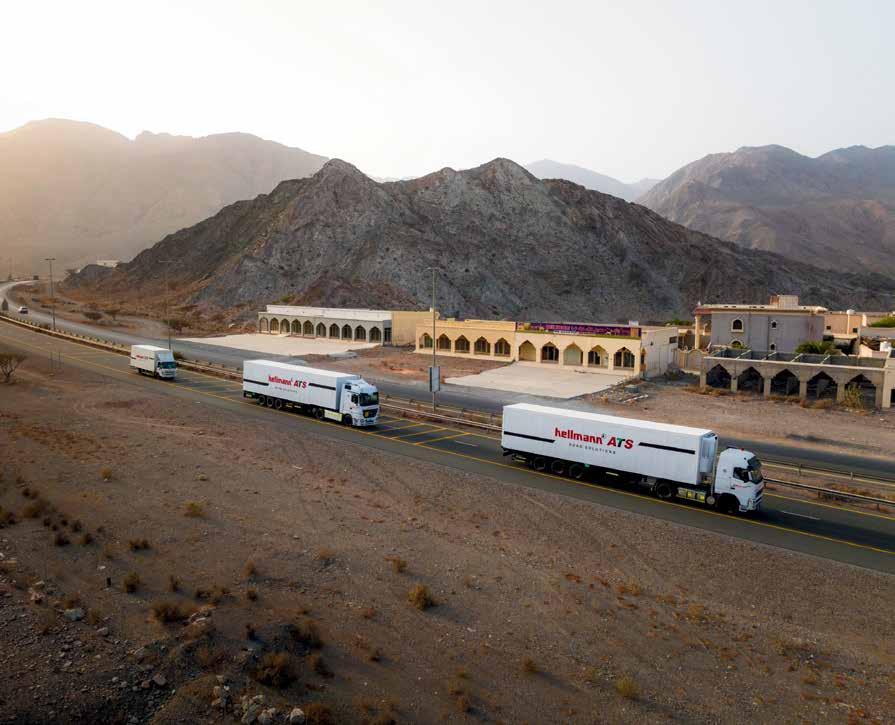






SIGNATURE MEDIA FZ LLE
P. O. Box 49784, Dubai, UAE
Tel: 04 3795678
Email: info@signaturemediame.com
Exclusive Sales Agent
Signature Media LLC
P.O. Box 49784, Dubai, UAE
Publisher: Jason Verhoven jason@signaturemediame.com
Editor: Abigail Mathias abigail@signaturemediame.com
Art Director: Johnson Machado johnson@signaturemediame.com
Production Manager: Roy Varghese roy@signaturemediame.com

The holy month of Ramadan has been exceptionally noteworthy this year. As business houses opened their doors and hearts to welcome associates in the spirit of togetherness, the essence of unity was undoubtedly felt across industries. We take you behind the scenes to these intimate gatherings that truly embody the spirit of this special season.
Printed and Distributed by Masar Printing and Publishing L.L.C., Part of Dubai Media Incorporated Dubai, UAE
Contributor’s opinions do not necessarily reflect those of the publisher or editor and while every precaution has been taken to ensure that the information contained in this magazine is accurate and timely, no liability is accepted by them for errors or omissions, however caused. Articles and information contained in this publication are the copyright of Signature Media FZ LLE & SIGNATURE MEDIA LLC and cannot be reproduced in any form without written permission.
Incorporating the sentiment of teamwork, our cover story on UD Trucks highlights the company’s greatest asset – resilience. We also have an exclusive from Etihad Cargo which discusses its evolving product strategy. Warehouse Automation experts Addverb explain the future of Horizontal Carousel Systems. Hellmann Healthcare Logistics offers their perspective on the systematic movement of medical supply. The CEO and Founder of Goods2load offers a point of view on keeping up with sales in an innovative manner. We bring you exclusive insights from Tetra Pak as well as GROHE, besides other leading figures in the industry.
Guest columns from Noman Ali and Dr. Fabienne Chedid, Assistant Professor at Heriot-Watt University Dubai, are also an integral part of this month’s edition.
Additionally, Guillaume Crozier, dnata’s Chief Cargo Officer makes a special appearance in our last page special. We’d like to pause for a moment and wish all our readers a very prosperous and peaceful Eid Al Fitr. May the days ahead bring you closer to achieving your goals.
Happy reading!
Abigail Mathias Editor
abigail@signaturemediame.com www.globalsupplychainme.com
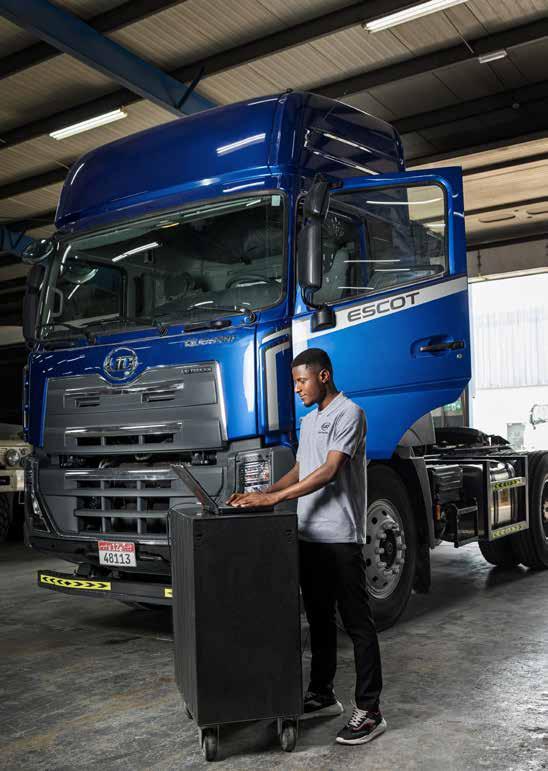
1500+
150+

UD Trucks is known for its focus on innovation, fuel efficiency, and driver comfort. The company offers a diverse range of vehicles and services tailored to meet various industry needs. In an exclusive interview with Mourad Hedna – President, UD Trucks MEENA, we discover the profound impact these vehicles have made in the region.
UD Trucks has made a significant impact on the market, particularly in the Middle East, Africa, and North Africa (MEENA) regions. The company achieved remarkable sales growth, including a 26% increase in 2024 across the MEENA region. In Saudi Arabia, the UAE and Qatar, truck sales rose by 50%, with strong performance in both heavy-duty and medium-duty segments.
The brand has established itself as a leader in sectors like construction, waste management, and city distribution. For example, in Saudi Arabia, it plays a pivotal role in the construction sector, while in the UAE, it has become a key player in waste management.
GSC: UD Trucks has enjoyed another strong year across the Middle East, East, and North Africa (MEENA) region, maintaining its strong market share in the GCC while expanding its footprint in key East African markets. What are the company’s plans for 2025, particularly in the region?
MH: 2025 will be a year of growth, innovation, and strengthening customer relationships for us. We will be expanding into four new markets, building on our success last year in Kenya and Egypt, as we continue to develop our presence in Africa and the Middle East.
Customer satisfaction remains our top priority so we will be continuing to tailor our products and services to meet the evolving demands of businesses, ensuring that our trucks remain reliable, fuelefficient, and optimised for the region’s harsh conditions. This includes enhancing aftersales support, training, and connectivity solutions to improve vehicle uptime.

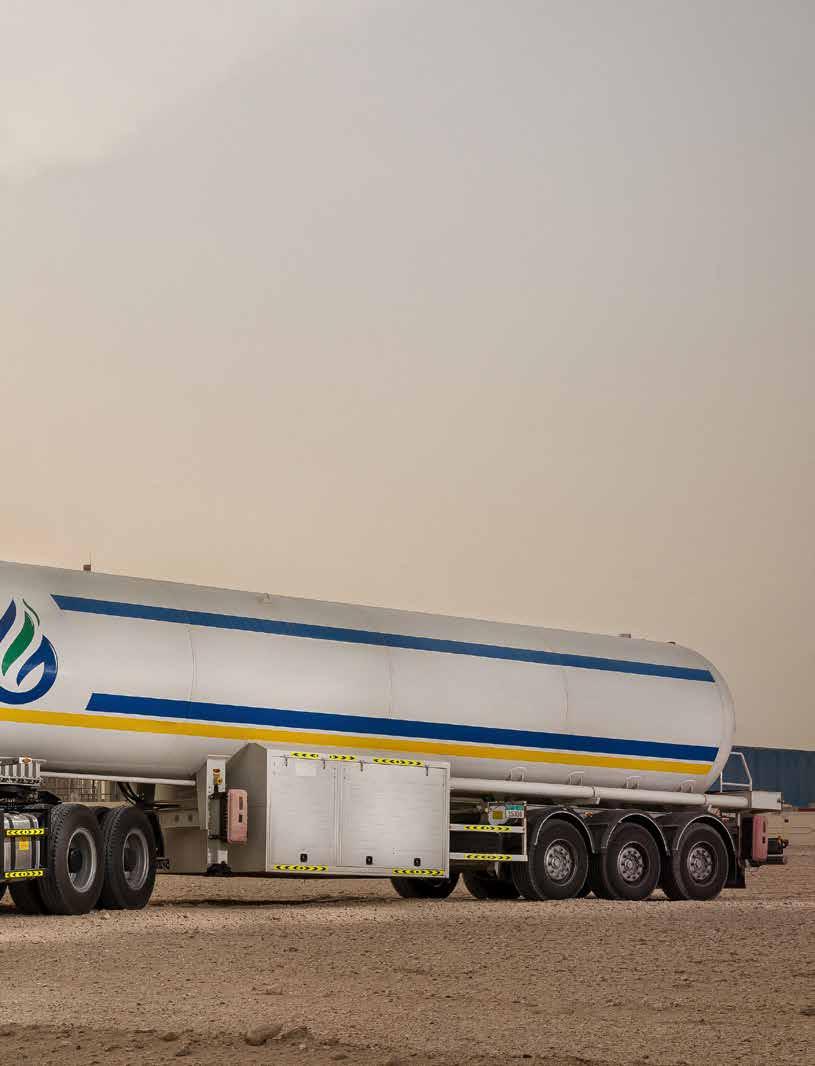
Another key focus for us this year is our commitment to giving back to society. Through initiatives such as women’s empowerment programmes, ocean conservation, and our Plastic Pledge, we will continue to invest in sustainable and community-driven projects. Our goal is not only to lead the sector but also to make a positive impact on the region.
GSC: Please share some of the sales results the company has achieved in the past year.
MH: 2024 was another record-breaking year for UD Trucks in the MEENA region, as we achieved a 26 per cent volume growth, making us the fastest-growing truck brand.
In Saudi Arabia, the UAE, and Qatar, our sales increased by 50 per cent, driven by strong demand in the heavy-duty, construction, and waste management sectors. For example, we reinforced our leadership in waste management in Saudi Arabia while also playing a pivotal role in major infrastructure projects like Qatar’s North Field Expansion project.
We also expanded into key African markets. Our re-entry into Kenya and launch in Egypt have already generated strong demand, proving that our vehicles are well-suited to the diverse operating conditions found across the region.
We also measure our achievements beyond product sales. We’re proud we managed to grow significantly our aftersales service agreements, which now cover over 1,000 trucks to ensure customers benefit from proactive maintenance and optimised fleet management.
GSC: What do you consider the USP of UD Trucks? What sets them apart?
MH: We are known for our durability, reliability, and adaptability both in our trucks and business operations. For the products, these qualities are essential to operate in the tough conditions of the region. Our trucks are engineered specifically for this market, ensuring they withstand extreme temperatures and demanding terrain.
Another factor is our customer-first approach, which truly sets us apart. We offer customised solutions, from tailored service contracts to industryspecific modifications, ensuring that businesses maximise efficiency and reduce total cost of ownership (TCO).
Additionally, our people make the difference. Through their commitment to excellence, the UD Trucks team and our regional partners continuously go the extra mile, offering hands-on driver training, telematics solutions, and personalised aftersales support.
GSC: Can you elaborate on any recent mergers or partnerships that UD Trucks has been involved with?

MH: UD Trucks was acquired by Isuzu Motors in April 2021 as part of a strategic alliance with the Volvo Group. This move has allowed us to leverage Isuzu’s global expertise and economies of scale, particularly in the heavy-duty truck segment.
The acquisition has strengthened our technological advancements, purchasing power, and logistics capabilities. It has also opened new opportunities for collaborations in research and development, particularly in sustainability and alternative fuel technologies. By working alongside Isuzu, we continue to enhance our product offerings, innovation, and customer service, ensuring that we remain at the forefront of the commercial vehicle industry.

GSC: What are the key features and specifications of your latest truck models?
MH: Our Euro 5 Quester and Croner models are designed to meet modern efficiency, safety, and environmental standards, ensuring they meet the evolving needs of businesses across the region. Both models integrate advanced technology to enhance performance while lowering operating costs.
The Quester features the ESCOT automated manual transmission, which optimises gear shifts for smoother driving, reduces driver fatigue, and significantly improves fuel efficiency. The Croner, on the other hand, is equipped with a factoryfitted Allison automatic transmission, making it ideal for urban applications with frequent stop-start operations.
To maximise uptime and lower maintenance costs, both models benefit from extended service intervals and a robust engine configuration that improves reliability. Safety remains a key priority, with features such as advanced braking systems, lane change assistance, and blind spot detection ensuring a secure driving experience. Additionally, the Smart Dashboard provides realtime driving coaching to help drivers find the optimal fuel-saving “sweet spot,” while UD Connected Services offer geofencing, vehicle tracking, and detailed fuel consumption reports to help fleet managers optimise efficiency.
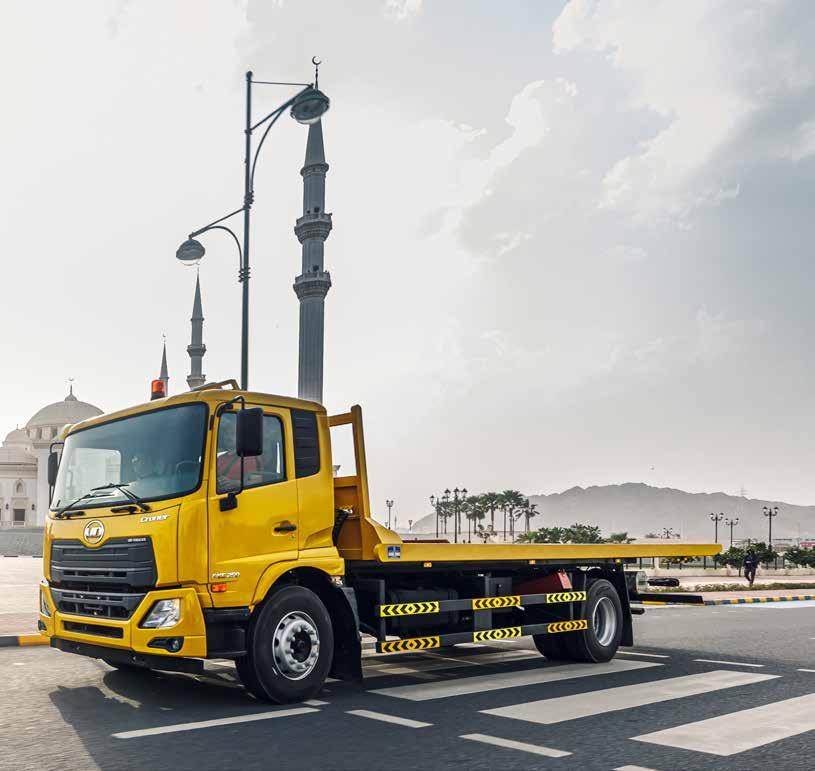
These innovations make us and our products a trusted choice for businesses looking for durable, highperformance vehicles tailored to the region’s demanding conditions.
GSC: Can you provide details about the fuel efficiency and environmental impact of your vehicles?
MH: UD Trucks is committed to reducing emissions and optimising fuel efficiency. Our Euro 5 models represent a significant step forward in this journey, offering up to 10 per cent improved fuel economy with optimised driveline configurations. The introduction of AdBlue technology enhances emissions compliance, ensuring that our trucks meet the highest environmental standards. Beyond vehicle design, we promote eco-driving practices through our Driver Guard programme, ensuring drivers maximise fuel savings. These efforts reflect our commitment to sustainability and operational efficiency, aligning with the region’s shift towards greener transportation solutions.
GSC: What innovative technologies are integrated into your latest truck models?
MH: Our latest trucks are equipped with advanced technologies with a key focus to enhance efficiency, safety, and overall performance for our clients and customers. To start with, the ESCOT automated manual transmission in the Quester ensures smoother gear shifts, reducing driver fatigue and improving fuel economy. In the Croner, the factory-fitted Allison automatic transmission allows for seamless stopstart operations, making it ideal for urban and municipal applications. Other types of technology we integrate focus on the safety, these include advanced braking systems, lane change assistance, and blind spot detection providing additional protection for drivers and road users alike. However, we also integrate technology beyond the trucks themselves, as we offer a suite of digital solutions to optimise fleet management. For example, The Smart Dashboard provides real-time driving coaching, helping drivers maximise fuel efficiency and reduce wear and tear.
Meanwhile, UD Connected Services and My UD Fleet provide telematics solutions such as geofencing, fuel consumption reports, and driver performance tracking, allowing fleet managers to make informed, data-driven decisions that enhance operational efficiency. By integrating both in-truck technology and digital fleet management tools, UD Trucks ensures that businesses benefit from a smarter, safer, and more costeffective transportation solution.
GSC: How do your trucks ensure driver safety and comfort?
MH: Driver well-being is a priority at UD Trucks. Our vehicles feature spacious, climate-controlled cabins with ergonomic seating and intuitive controls to enhance comfort during long hauls. The ESCOT and Allison automatic transmissions, which I touched on previously, reduce driver fatigue, allowing for smoother handling and less manual intervention.
Our trucks are also equipped with cutting-edge safety features, including lane change assistance, blind spot detection, electronic stability control, and automatic braking systems. Additionally, our Smart Dashboard that I explained provides real-time coaching to make sure the drivers’ performance is optimum without compromising on their safety. Additionally, through our Driver Guard programme and Extra Mile Challenge, we ensure that drivers receive top-tier training and recognition, reinforcing our commitment to safety.
GSC: What are your company’s policies on sustainability and environmental responsibility?
MH: Sustainability is central to UD Trucks’ Better Life philosophy and a core to our wider global strategy. We have a strong commitment to reducing emissions, minimising waste, and optimising resource efficiency across all operations. We are actively working towards decarbonisation and achieving net-zero waste by leveraging renewable energy sources and enhancing environmental management practices throughout its value chain.
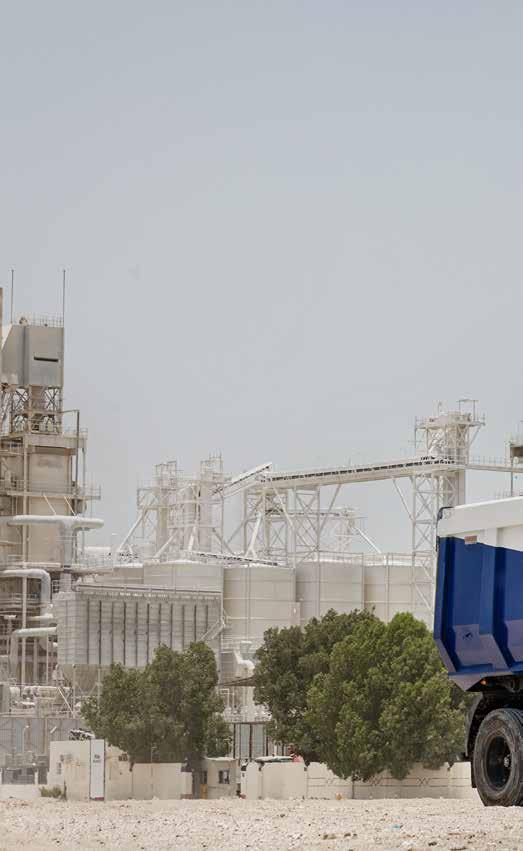
With the goal of carbon neutrality by 2050, UD Trucks is reducing CO₂ emissions across its business activities by upgrading facilities with energy-efficient technologies and increasing the use of electricity derived from renewable sources. Moreover, we also collaborate with suppliers who prioritise sustainable practices, ensuring a responsible and environmentally conscious supply chain across our operations regionally and globally.
Waste reduction is another key focus, with efforts to enhance recycling, reuse resources, and implement responsible disposal processes at all operational levels. UD Trucks remains dedicated to sustainability, embedding environmentally responsible practices into its operations to drive long-term positive impact.
GSC: What is the total strength of the company in the UAE?
MH: UD Trucks continues to strengthen its presence in the UAE, having firmly established itself as a key player in Abu Dhabi, Dubai, and the Northern Emirates. Our market position is reinforced by strong sales growth, increasing demand in sectors like construction and waste management, and ongoing investments in aftersales service enhancements.
A prime example of our impact in the UAE is our leading role in the waste management sector, where we work closely with major industry players such as BEEAH, Lavajet, Tadweer, Averda, and Solv.
A major milestone was securing an order for 300 trucks as part of the Abu Dhabi Waste Management Project, one of the most competitive tenders in the sector. This initiative, led by Abu Dhabi Municipality, Tadweer, and key subcontractors, is aimed at enhancing the waste management infrastructure in response to rapid urban expansion. Our success in this highly competitive bid is a testament to the trust in our products and services.
GSC: Do you offer any fleet management solutions or tools for optimising fleet operations?
MH: Yes, we do offer comprehensive fleet management solutions through elements that I touched on earlier. UD Connected Services and My UD Fleet for example, are designed specifically to enhance efficiency and optimise operations. These telematics systems provide realtime tracking, geofencing, and route optimisation, enabling fleet managers to monitor vehicle performance, detect inefficiencies, and reduce operational costs.
Fuel consumption reports and driver behaviour insights help businesses identify areas for improvement, leading to lower fuel expenses and maximised uptime. Additionally, UD Trucks complements these digital solutions with driver training programmes such as Driver Guard and the Extra Mile Challenge, ensuring that operators adopt safer and more efficient driving habits.
By combining cutting-edge technology with hands-on training, UD Trucks empowers businesses to streamline operations, improve sustainability, and enhance overall fleet productivity.
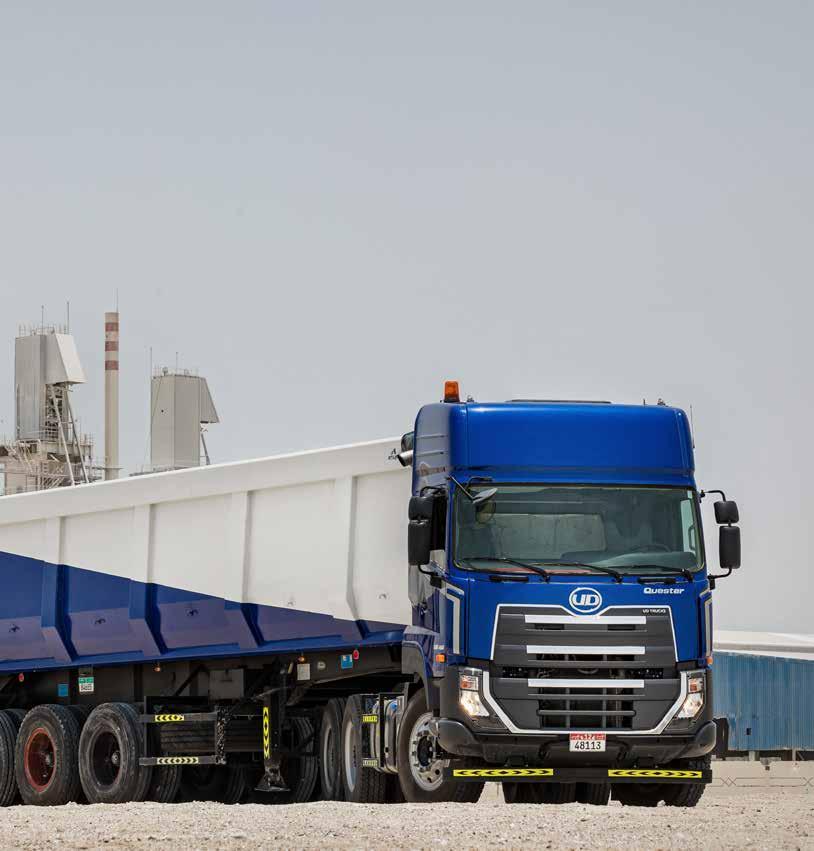
Turkish Cargo has been honoured with the “FastestGrowing International Cargo Airline of the Year” award by STAT Trade Times for its outstanding performance in the air cargo industry. The award was presented at the ‘Air Cargo Africa’ exhibition and conference, held in Nairobi, Kenya, from February 19 to 21, 2025.
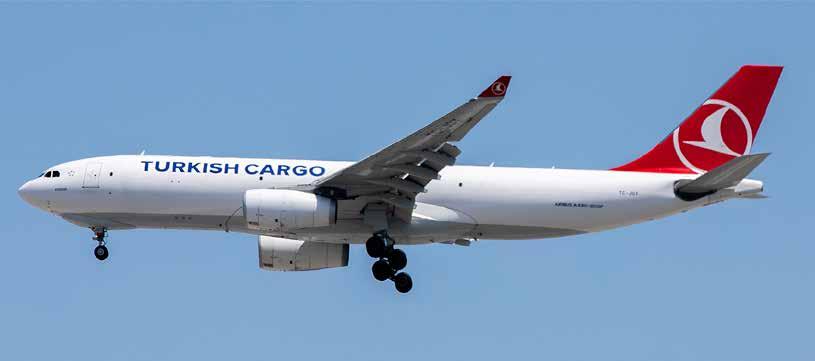
Turkish Cargo is known for its innovative approaches, such as AI-based real-time dynamic pricing and digital booking processes.
Commenting on the award, Ali Türk, Chief Cargo Officer of Turkish Airlines, said: “We are honoured to once again be recognised as the world’s fastest-growing air cargo brand. I would like to extend my thanks to all our colleagues, customers and business partners who played a role in this achievement. As Turkish Cargo, we continue to expand our global flight network and strengthen our position
in the industry through operational efficiency and innovative logistics solutions provided by our SMARTIST facility. This award is proof that we are on the right track. We will continue to deliver the best service to our customers by further investing in human resources and technology. “
The STAT Times International Air Cargo Excellence Awards are presented following a two-stage evaluation process that involves industry stakeholders. The first stage involves evaluating the nominees based on the documents they submit, while
the second stage determines the winners through a voting process by industry professionals.
Turkish Cargo’s recognition reflects its growing global flight network, state-ofthe-art SMARTIST cargo facility at Istanbul Airport, innovative logistics solutions, and commitment to sustainable growth.
Turkish Cargo aims to increase the number of cargo destinations to 150 and cargo aircraft to 44, boost the capacity of its SMARTIST facility to 4.5 million tons, and grow its operational volume to 3.9 million tons by 2033.
Turkish Cargo distinguishes itself in the global air cargo industry with several unique features: Extensive Network: It connects over 340 destinations in more than 130 countries, providing one of the most comprehensive cargo networks worldwide.
State-of-the-Art Facilities: Their SMARTIST terminal in Istanbul is a cutting-edge logistics hub, equipped with advanced technology to enhance efficiency, such as automated storage and retrieval systems.
Specialised Cargo Handling: Turkish Cargo is known for its expertise in handling a wide range of shipments, including pharmaceuticals, perishable goods, livestock, and valuable items, ensuring the highest standards of care and safety.
Sustainability Initiatives: They focus on eco-friendly operations and have certifications like LEED v4.1, showcasing their commitment to reducing their environmental impact.
Digital Solutions: They offer innovative digital tools for booking, pricing, and tracking, making the shipping process faster and more user-friendly.
Global Recognition: Turkish Cargo has received various awards for its excellence, reliability, and service quality, reinforcing its reputation as a trusted brand in the industry.
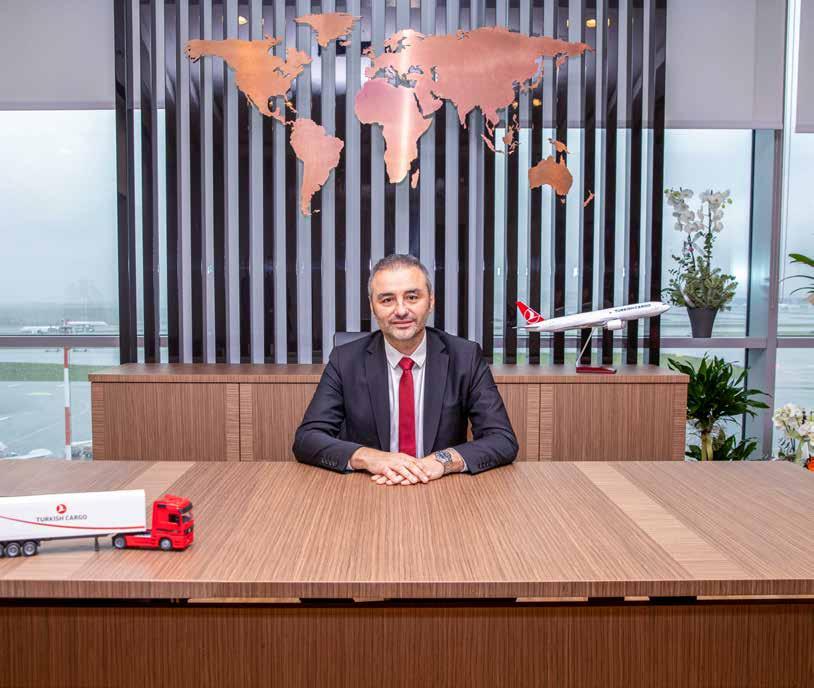
Etihad Cargo embarked on a transformational journey in 2024, reinforcing its commitment to delivering outstanding customer experience and world-class air cargo solutions. As part of this evolution, the carrier restructured its global operations into four key regions to get closer to its customers, established a dedicated Customer Experience department, and appointed senior managers to oversee its expanding portfolio of specialised services. Among these strategic appointments, Jacob David was named Senior Manager Products, leading the development and refinement of tailored solutions. With a strong focus on customercentricity, Etihad Cargo remains dedicated to adapting its offerings to meet the dynamic needs of its clients and emerging market demand worldwide.

Etihad Cargo holds the full suite of IATA CEIV certifications, covering Pharma, Fresh, Live Animals, and Lithium Batteries. The carrier’s extensive range of specialised services includes nine distinct products tailored to meet diverse industry needs. PharmaLife ensures the safe and efficient transportation of pharmaceuticals, while FreshForward maintains the integrity of perishable goods. SecureTech provides solutions for high-value technology shipments, including lithium battery-powered devices. LiveAnimals and SkyStables together cater to the safe transport of live animals and equine shipments, ensuring world-class welfare standards. FlightValet facilitates the smooth movement of premium vehicles, while FlyCulture is designed for the transportation of cultural artefacts.
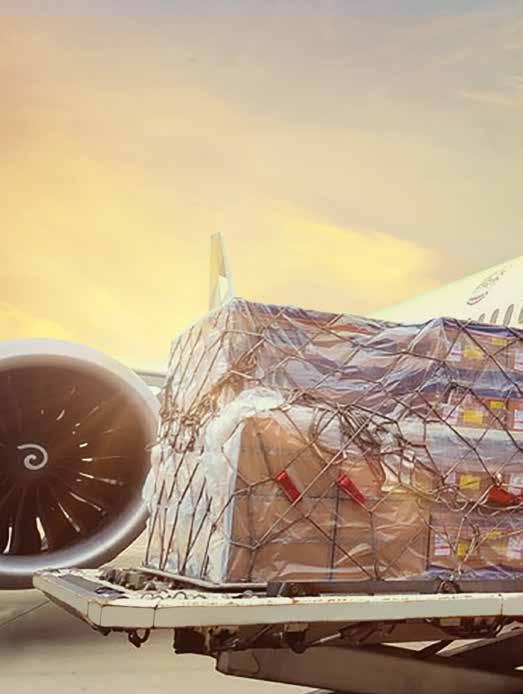
SafeGuard offers additional protection for high-value cargo, and AirMail ensures the secure and efficient delivery of postal consignments across the global network.
“Etihad Cargo has developed a strong and diverse product portfolio, but we are always looking to push the boundaries of service excellence. Our goal is to elevate the customer experience and create tailored solutions that truly meet our customers’ needs,” said David. “By refining our existing offerings, launching new features and introducing innovative products, we have reinforced our position as the air cargo partner of choice for businesses worldwide.”
A critical element of Etihad Cargo’s strategy is building expertise within its team. The carrier has introduced dedicated business development managers and formed a specialised product engineering team. This skilled group will drive innovation and strengthen the portfolio of products, ensuring each service upholds the highest industry standards. From PharmaLife and FreshForward to
SecureTech and SkyStables, every product is continuously improved to address emerging market needs. By working closely with customers, Etihad Cargo ensures its tailored solutions remain relevant, effective, and aligned with evolving expectations.
To reinforce its PharmaLife product, Etihad Cargo collaborates with government and healthcare stakeholders, including Abu Dhabi’s Department of Health and Customs, and is an active member of Pharma.Aero.
This collaboration led to the launch of Pharma Corridor 2.0 between Abu Dhabi and Brussels, linking airports with IATA CEIV Pharma-certified cargo communities. The corridor ensures complete transparency and real-time tracking for temperaturecontrolled pharmaceutical shipments, strengthening Abu Dhabi’s position as a global healthcare and life sciences hub. Additionally, the Fresh Corridor 2.0 between Amsterdam and Abu Dhabi has played a key role in optimising perishable
shipments, helping Etihad Cargo to achieve record volumes for the Netherlands in 2024.
Beyond these corridor developments, the carrier has implemented several other key initiatives to expand its offerings. SecureTech, introduced in 2024, has successfully addressed the growing demand for transporting e-commerce and technology shipments, including lithium battery-powered devices. Other developments include a dedicated SkyStables support desk for equine logistics, further reinforcing the carrier’s commitment to meeting specialised customer needs.
“This is a transformative period for Etihad Cargo,” David concludes. “We have a skilled team in place and regional expertise driving product development. By combining our deep industry knowledge with a growing network and customer-driven innovation, we are bringing the most advanced air cargo solutions to market.”


In line with Abu Dhabi’s ambition to digitally transform the trade and logistics sectors, the Abu Dhabi Investment Office (ADIO) and Maqta Technologies Group, part of AD Ports Group, have partnered with Etihad Cargo to introduce new features to the Advanced Trade and Logistics Platform (ATLP).
Developed and operated by Maqta Technologies Group, ATLP was inaugurated in May 2020 by His Highness Sheikh Khaled bin Mohamed bin Zayed, Crown Prince of Abu Dhabi and Chairman of the Abu Dhabi Executive Council. The platform aims to unify trade and logistics services across Abu Dhabi, including air, land, sea, and industrial free zones.
ATLP’s new functionalities are designed to enhance the export rate determination and booking process for air shipments, thereby enhancing efficiency, accuracy, and user satisfaction for logistics providers in Abu Dhabi.
As part of ATLP’s ongoing mission to offer world-class services, this latest enhancement ensures that stakeholders can make informed decisions, perform seamless bookings, and stay compliant with regulations, setting a new standard for air export operations.
The update will give logistics providers in Abu Dhabi real-time access to Etihad Cargo’s extensive network with immediate visibility of available capacity and pricing, enabling swift and accurate booking decisions. Services from Etihad Cargo and Etihad Airport Services, the designated ground handling agent, will be integrated into the platform. The update also streamlines operations for freight forwarders holding Cargo Accounts Settlement System (CASS) numbers.

Mohammad Al Kamali, Chief Trade and Industry Officer, Abu Dhabi Investment Office (ADIO), said:
“The Abu Dhabi Trade and Logistics Platform’s (ATLP) continues to be a leading digital solution, with this latest enhancement only further enhancing the emirate’s trade and logistics sectors. Through the collaboration among all partners, traders can now leverage actionable, real-time data for more precise, informed decisionmaking, while enhanced optimization significantly cuts processing times. Abu Dhabi remains dedicated to delivering cutting-edge trade and logistics solutions, reinforcing its ambition to cultivate a dynamic trade environment.”

Stanislas Brun, Vice President Cargo at Etihad Cargo, said: “Etihad Cargo is proud to partner with Maqta Technologies Group to support the expansion of the ATLP, further driving digital transformation across Abu Dhabi’s logistics sector. This latest enhancement aligns with Etihad Cargo’s commitment to delivering innovative, customer-centric solutions that streamline air cargo operations. By simplifying the air export rate determination and booking process, Etihad Cargo enables customers and partners to achieve greater efficiency and accuracy while ensuring compliance with international standards. Collaborations like this are key to advancing Abu Dhabi’s position as a global hub for trade and logistics.”
Dr. Noura Al Dhaheri, CEO of Maqta Technologies Group and Digital Cluster- AD Ports Group, said: “In today’s era of rapid digital transformation, Maqta Technologies Group is at the forefront of redefining trade and logistics. The launch of these new features on Abu Dhabi’s Official Single Trade Window, ATLP, reflects our commitment to driving innovation, enhancing efficiency, and delivering value to our stakeholders. Guided by the vision of our wise leadership, we are confident that this collaboration with Etihad Cargo will accelerate trade via air, further strengthening Abu Dhabi’s position as a global trade and logistics hub.”

Enhance your picking process now. With Advanced Pick Stations, you can achieve up to 1,000 picks per hour, boosting productivity and ensuring faster order fulfilment.
Efficiency drives success for your business. An ergonomic set-up allows you to do just that — ensuring picking quality and speed are consistent.



Parallel Picking:
Achieve up to 800 picks per hour with four order totes, maximizing your output
User-Friendly Features:
Height-adjustable platforms, Put to Light guidance, and graphical user interface
Ergonomic Design:
Touch-friendly surfaces reduce picking errors to near zero
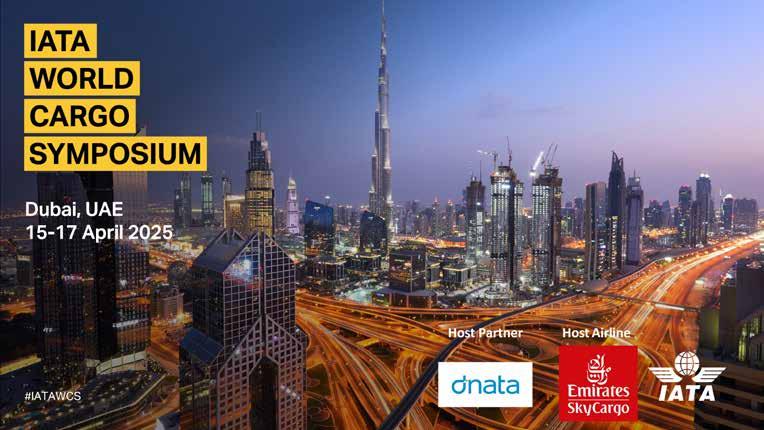
The International Air Transport Association (IATA) announced that the 2025 World Cargo Symposium (WCS) will focus on digitalization, sustainability and safety/security as the key issues in helping the global air cargo industry as it adapts to unfolding geopolitical shifts.
Air cargo demonstrated its resilience in adapting to the post-pandemic world. In 2024, more cargo was transported by air than ever before. But the world is moving at an even faster pace with technological advancements, geopolitical shifts, evolving risks, and changing customer needs. At WCS in Dubai, we’ll collectively take stock of what’s next for air cargo, focusing on digitalization, sustainability, safety/security, and e-commerce. The growing demand for air cargo underscores its critical role,” said Willie Walsh, IATA’s Director General.
WCS is taking place in Dubai, United Arab Emirates, from 15 to 17 April hosted by Emirates SkyCargo and dnata. It is the second time the WCS is hosted in the United Arab Emirates, with the first in 2017.
“With its strategic location and worldclass logistics infrastructure, Dubai is a natural choice for the 2025 IATA World Cargo Symposium. As this year’s host
airline, Emirates SkyCargo is set to showcase its expanding capabilities and commitment to driving efficiency, innovation, and connectivity across the air cargo industry. The symposium will be a key platform to shape the future of air cargo and align on the best strategies for growth,” said Badr Abbas, Divisional Senior Vice President, Emirates SkyCargo.
“We’re proud to welcome industry leaders to Dubai, home to our first and largest operations, at a time of incredible growth and transformation in the cargo sector. With safety, innovation and sustainability at the core of our business, the IATA World Cargo Symposium offers an excellent opportunity to exchange ideas and explore new solutions. We look forward to connecting with our partners and stakeholders to enhance both operational and environmental efficiency, driving meaningful progress across the industry”, said Clive Sauvé-Hopkins, dnata’s CEO - Airport Operations.
Walsh along with Brendan Sullivan, IATA’s Global Head of Cargo will be speaking at the event along with:
Badr Abbas, Division Senior Vice President, Emirates SkyCargo
Clive Sauve-Hopkins, CEO - Airport Operations, dnata
Andres Bianchi, Chief Executive Officer, LATAM Cargo and IATA Cargo Advisory Council Chair
Gabriela Hiitola, SVP, Finnair Cargo
Ludwig Hausmann, Senior Partner and Leader of the Logistics Sector in Europe, McKinsey & Company
Tom Owen, Director Cargo, Cathay Cargo
The symposium will feature plenary sessions, specialized tracks, workshops, and executive summits, addressing:
Digitalisation: The role of AI and automation in the future of air cargo.
Sustainability: Strategies for decarbonization, reducing single-use plastics and ESG reporting.
Risk & Resilience: Navigating geopolitical uncertainty, regulatory shifts, and supply chain disruptions.


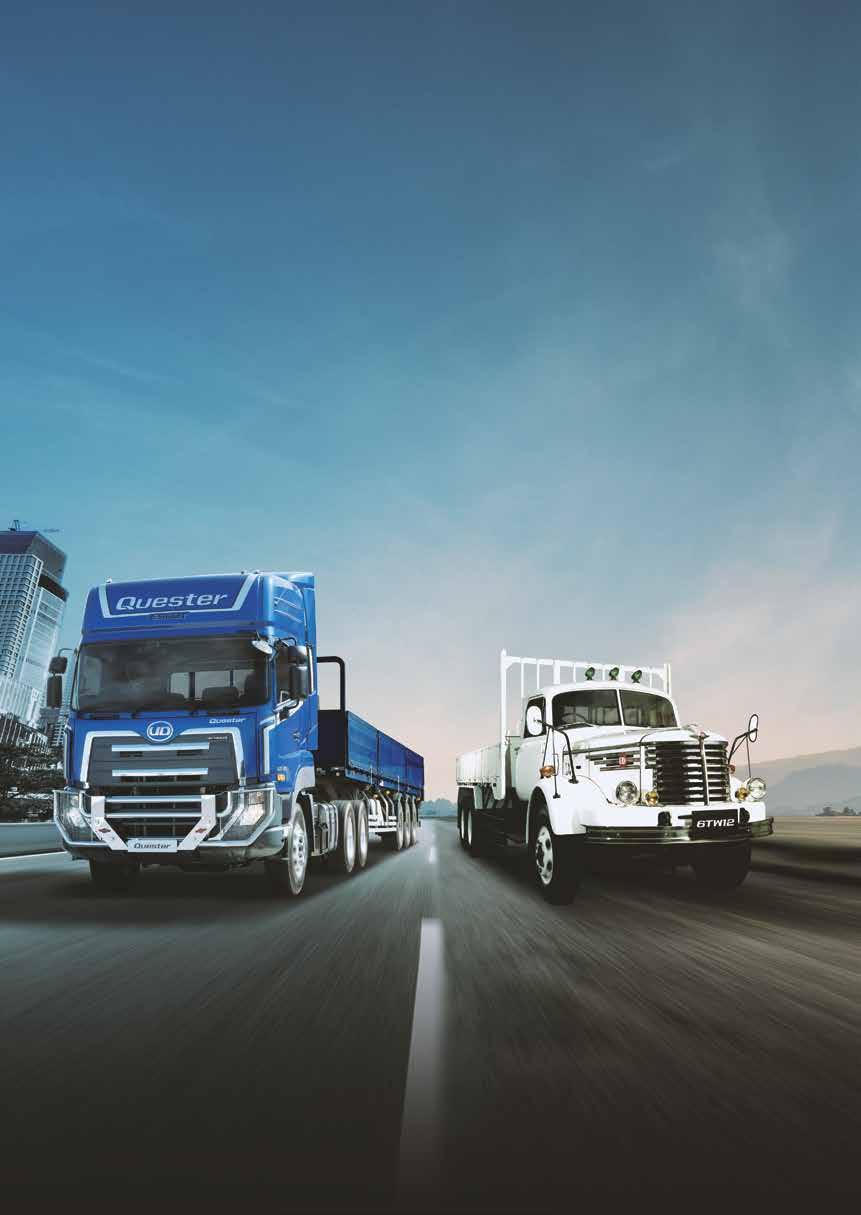

Emirates SkyCargo has long been a world leader in the fight against the illegal wildlife trade, with the aim to preserve the beauty and biodiversity of the natural world for generations to come. As we approach World Wildlife Day, the cargo arm of the world’s largest international airline reflects on the milestones achieved along its journey.
Badr Abbas, Divisional Senior Vice President, Emirates SkyCargo, said, “Every day, Emirates SkyCargo supports global supply chains, connecting businesses with suppliers and customers in over 145 destinations worldwide. But, the illegal wildlife trade is one supply chain we will not facilitate – in fact, we proudly disrupt it. By refusing to carry trafficked wildlife, the land, air and sea logistics network is in the unique position to stop the illicit trade in its tracks. From education and awareness programmes for our staff and customers, to updating our operational protocols in line with the latest guidance from welfare organisations and governments, we will continue working to keep wildlife wild.”
It starts at home
From its early days, Emirates SkyCargo established a zero-tolerance policy on the illegal wildlife trade, a complete ban on hunting trophies for the Big-4, even into destinations where its permitted, and embargoes on the carriage of banned species and other associated products. Emirates SkyCargo will not uplift shark fins,

rhino horns or elephant tusks, leopard skins, and a number of other coveted, but illegal, products.
The freight division has implemented stringent protocols to identify and stop the movement of these products, including screenings, spot checks during transit, in depth document verification, and confirming the authenticity of permits, to ensure every shipment is legal. Lending this experience to the ecosystem, Emirates SkyCargo supported Project Vikela, which aimed to develop an automated system for detecting illegal wildlife products in airport security screening systems across Africa, a
region disproportionately targeted by the trade due to its rich and unique wildlife.
Frontline employees are trained to recognise and report suspicious cargo via a dedicated reporting channel, empowering staff and partners to stop illegal trade by flagging confidential information that can protect endangered species. To date, the airline has trained thousands of staff at the hub in Dubai and at outstations across cargo and passenger operations, as well as extending the training to contracted ground handling staff at outstations, bringing the total number of trainees to over 30,000.

The embargoes Emirates SkyCargo implements are ever evolving. Following the African Union’s landmark decision to ban the slaughter of donkeys in 2024, the cargo arm immediately extended its embargo to cover donkey hides. In addition to enhancing animal welfare, the decision safeguards tens of thousands of communities across Africa that rely on donkeys for their wellbeing and livelihoods.
In partnership with international animal welfare charity, The Donkey Sanctuary, the airline co-created the Aviation Risk and Threat Assessment operational guide, highlighting the risks posed by the donkey skin trade and its association with serious and organised criminal activity. The guide provides critical knowledge in the fight against the donkey skin trade and encourages the wider logistics ecosystem to bolster their own detection and enforcement protocols.
Leveraging its specialist service for the safe and comfortable transportation of live animals, Emirates SkyCargo has supported animal welfare organisations with rescue missions. Last year, Emirates SkyCargo worked with Animals Lebanon to rescue Sara, a four-and-a-half-month-old lion cub from a life as a house pet, transporting her to a sanctuary in Cape Town for a second chance at life where she belongs.
enforcement
Emirates SkyCargo consistently demonstrates its strong commitment to supporting CITES (Convention on
International Trade in Endangered Species of Wild Fauna and Flora) protocols in collaboration with entities such as the UAE Ministry of Climate Change and Environment.
In collaboration with Dubai Customs and Dubai Police, Emirates SkyCargo has intercepted numerous wildlife shipments, successfully disrupting illegal animal trafficking networks.
It is not just the air freight division that supports the fight against illegal wildlife trafficking; it’s a commitment across the entire Emirates Group. In 2023, this was reinforced when the airline achieved the IATA Environmental Assessment (IEnvA) certification, which includes a module on illegal wildlife trafficking across both cargo and passenger operations.
The airline was one of the founding signatories of the Buckingham Palace Declaration, which outlines key actions to strengthen defences against trafficking by removing the vulnerabilities in transportation and customs that criminals are currently exploiting. As part of this commitment, Emirates actively contributes towards the United for Wildlife Transport Taskforce and is part of the Steering Committee of the United for Wildlife MENA Chapter, which was launched in early 2022, actively joining meetings to identify challenges and solutions with other key stakeholders.
Emirates also activates its resources to further the cause. Emirates famously showcased its commitment to conservation by deploying four A380s adorned with
liveries featuring endangered species. Through over 6,000 flights across 48 cities in 29 countries, we effectively spread the message, before creating a permanent reminder with a fifth model A380 stationed at London Heathrow roundabout.
In collaboration with United for Wildlife, Emirates Economy and Premium Economy passengers on long haul flights are treated to complimentary amenity kits, featuring eight of the most endangered species on the planet – the green sea turtle, African elephant, blue macaw, gorilla, hammerhead shark, lion, pangolin, and the black rhino. Since rolling out onboard in 2023, Emirates has distributed 9.8 million kits across its network, effectively educating passengers on the plight of critically threatened wildlife and inspiring travellers to join the fight against the illicit trade.
Shannon Scott, Vice President of Sustainability and Environment said, “Protecting wildlife is built into the Emirates Environmental Sustainability Framework, marking it as a core part of our DNA. We understand that it is essential to maintain our planet’s remarkable biodiversity, not just to support wildlife, but to protect human communities in all the destinations we serve. We take our responsibility seriously and remain committed to implementing meaningful sustainability and environmental initiatives that drive real impact, in our operations and across our industry.”
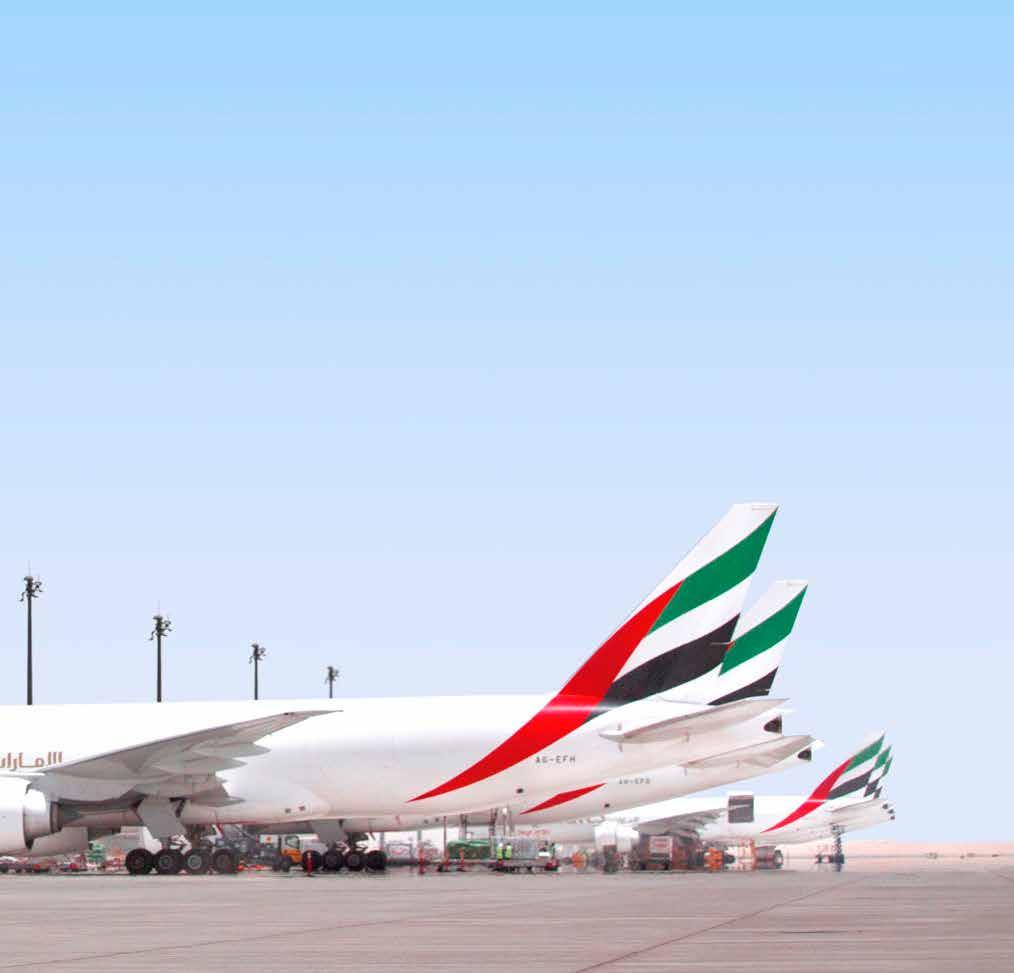

By Dr. Fabienne Chedid, Assistant Professor at Heriot-Watt University Dubai
As we navigate the evolving landscape of work, data-driven skills have emerged as a critical asset for individuals and organisations. The rapid advancement of digital technologies and the increasing reliance on data for decision-making have transformed job requirements across industries.
To prepare for the future workforce, employees must develop flexible and transferable data-related skills, even though the precise occupations that will require these skills remain uncertain. The systemic shifts accelerated by the COVID-19 pandemic and the rapid adoption of frontier technologies necessitate a proactive approach to skills development. Employers and employees alike must focus on continuous learning to remain competitive in a changing environment.
The world is witnessing a significant transformation in work practices. Digital tools, remote work solutions, and artificial intelligence (AI) applications have become
integral to modern business operations. As companies adapt to these changes, the demand for data-driven skills has surged. Organisations increasingly rely on data analytics to inform strategic decisions, optimize operations, and enhance customer experience. Consequently, individuals equipped with advanced data-handling capabilities will have a competitive edge in the future workforce.
One of the most essential data-driven skills is advanced data visualisation and reporting. The ability to transform complex datasets into intuitive visual representations enables stakeholders to grasp key insights quickly. Tools such as Tableau, Power BI, and Python-based visualization libraries allow
professionals to create dynamic dashboards and interactive reports. These tools not only improve decision-making but also facilitate communication across teams by presenting data in an accessible format. As businesses continue to generate vast amounts of data, proficiency in visualisation techniques will be indispensable.
Multidimensional and multilevel data structures
In an era where organisations deal with massive and complex datasets, understanding multidimensional and multilevel data structures is crucial. These structures enable professionals to analyse data across multiple perspectives, uncovering relationships and patterns that may otherwise go unnoticed. For
example, in supply chain management, multidimensional data analysis can reveal inefficiencies at different operational levels. Similarly, in healthcare, analysing patient data across multiple levels—such as demographics, medical history, and treatment outcomes—can lead to more personalised and effective interventions. Mastering these analytical techniques will be a key differentiator in future job markets.
Data storytelling
Beyond technical skills, the ability to translate data into compelling narratives— known as data storytelling—is becoming increasingly valuable. Effective data storytelling combines analytical insights with clear, engaging communication. Professionals who can craft data-driven narratives help organizations make informed decisions and drive meaningful actions. Storytelling in data involves structuring insights in a way that resonates with diverse audiences, whether they are executives, clients, or the general public. As AI and automation take over repetitive analytical tasks, human-centric skills such as storytelling will play a critical role in bridging the gap between raw data and strategic decision-making.
Data mining, sense making and sense giving
The process of extracting meaningful patterns from large datasets—data mining—remains a cornerstone of datadriven decision-making. By leveraging machine learning algorithms and statistical techniques, professionals can identify trends, correlations, and anomalies that inform business strategies. However, data mining alone is not sufficient. Employees must also develop sensemaking and sense giving abilities. Sensemaking involves interpreting and understanding complex data in a way that aligns with organisational goals, while sense giving refers to the ability to communicate these insights effectively to guide decision-making.
To project future demands and priorities, organisations must focus on developing skills that are flexible and transferable. The challenge, however, lies in predicting the precise nature of future occupations

and their skill requirements. As the world undergoes systemic shifts driven by technological advancements, economic fluctuations, and social transformations, the workforce must be agile and adaptable.
The COVID-19 pandemic was a catalyst for rapid digital transformation, leading to high levels of skill instability. However, postpandemic trends indicate that employers are beginning to anticipate and manage future skill requirements more effectively. With 39 per cent of workers’ core skills expected to change by 2030, continuous learning and skill enhancement will be essential. Compared to 2023, there has been a notable increase in workforce participation in training programs, with 50 per cent of employees engaging in upskilling initiatives as part of long-term learning strategies.
Employers must take an active role in equipping their workforce with the necessary data-driven skills. By fostering a culture of continuous learning, companies can ensure that employees remain adaptable to technological disruptions.
In conclusion, the future workforce will be shaped by data-driven skills that enhance analytical thinking, communication, and adaptability. From advanced data visualisation and multidimensional analysis to storytelling and sensemaking, these capabilities will be instrumental in navigating an increasingly data-centric world. As industries evolve, individuals who embrace data-driven competencies will remain resilient and valuable in the dynamic job market of the future.
Built in collaboration with Kardex, this advanced system brings a new dimension of precision, efficiency, and design to the warehouse automation industry. It also supports multi-user picking and offers unmatched accuracy, making it ideal for industries like pharmaceuticals, quick commerce, and auto spare parts.
At the heart of HOCA is its ingenious 180° shelf rotation mechanism, which directly delivers products to the operator, significantly reducing retrieval time. This feature is a game-changer for environments requiring fast-moving order fulfilment and high SKU assortments, offering a versatile solution that can be tailored to meet the specific needs of any industry.
One of the standout elements of the HOCA system is its flexible workstations, which are designed to scale efficiently with the available space. This enables a highly space-efficient configuration, making it an ideal solution for applications where both space and speed are critical.
Varun Visruthan, Manager of Addverb Middle East, states, “HOCA goes beyond automation-it equips industries with the precision-driven tools needed to stay competitive, optimising productivity in every warehouse environment.”

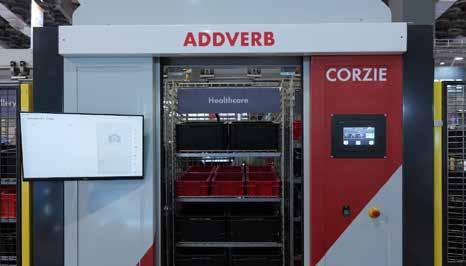
In a world where operational efficiency and speed are paramount, Addverb continues to innovate with the launch of its groundbreaking Horizontal Carousel System (HOCA). Designed to redefine the storage and picking process of small and medium-sized goods, HOCA is a prime example of Addverb’s commitment to pushing the boundaries of automation. We discover more about this game-changer in warehouse automation.
Key features of HOCA include:
• Sturdy design of high storage density: Maximizing vertical and horizontal space to optimize inventory management.
• Temperature-Controlled operations: Safely storing sensitive products with precision.
• Multi-level stations: Enabling simultaneous operations with fewer constraints.
• High throughput with 99.9% accuracy: Delivering unmatched picking accuracy.
• Maximum shelf payload support of up to 90 Kg: Providing flexibility for a wide range of products.
• Multi-user picking: Enhancing productivity with concurrent picking operations.
HOCA is particularly suited for industries where speed and accuracy are critical, such as quick commerce, pharmaceuticals, auto spare parts, and food & beverages. By improving warehousing and retrieval automation processes, HOCA drives
significant operational benefits, enhancing both top-line growth and bottom-line performance.
Addverb’s unwavering commitment to quality and innovation has earned the trust of leading global brands such as DHL, Landmark Group, Mondial Relay, Maersk, Unilever and Pepsico. This continued trust reflects Addverb’s expertise in delivering transformative automation solutions that enhance operational efficiency. With a strong presence across the Europe, US and Asia, and branch offices in the Netherlands and Dubai in the EMEA region, Addverb is steadily expanding its global footprint, driving the future of intelligent automation and enabling businesses to scale smarter and faster.
With this new release, Addverb reinforces its mission to provide worldclass automation solutions that empower industries to adapt and thrive in a rapidly changing market landscape. HOCA is not just an innovation; it’s a vital tool for businesses aiming to stay ahead of the curve in an increasingly fast-paced and competitive environment.
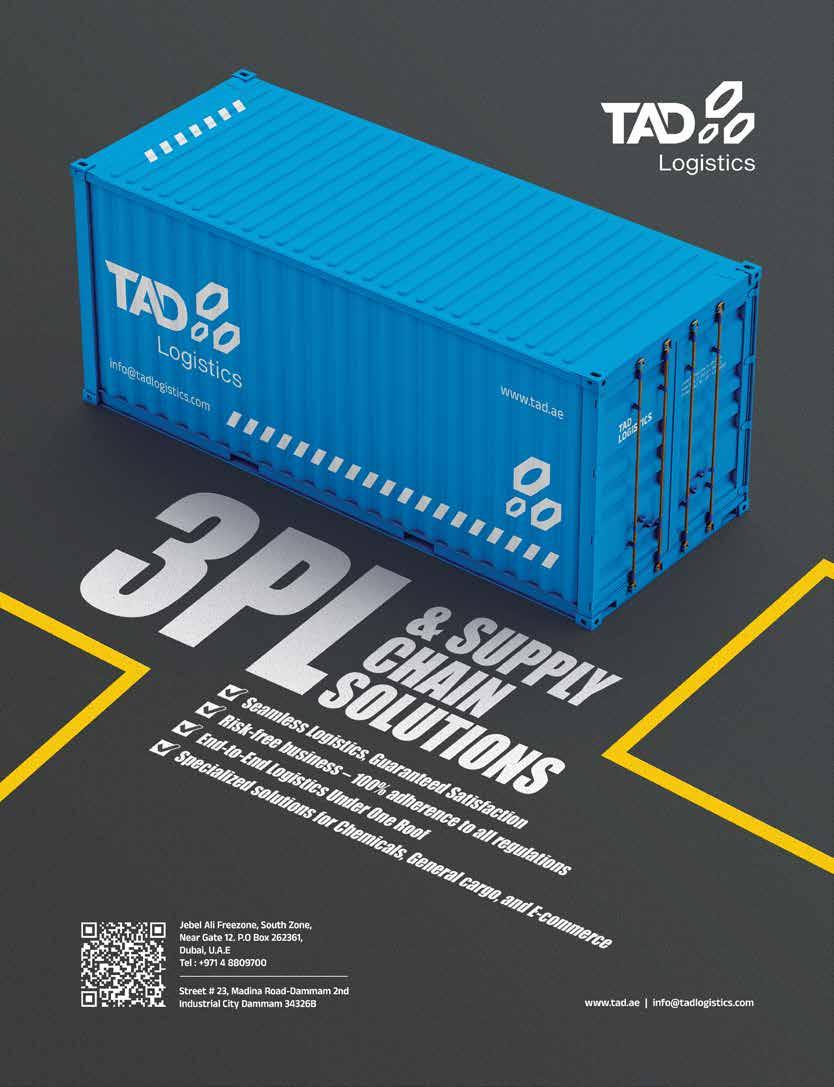
The lucrative logistics sector in the Middle East is growing from strength to strength. Investments in logistics assets have cemented countries such as Saudi Arabia and the UAE as regional logistics hubs. Logistics parks, ports, and air cargo facilities are expanding and breaking ground in these two countries.
As part of the Saudi Vision 2030 initiative, the Saudi Arabian government plans to inject US$267 billion into the logistics sector to become a global logistics hub. Meanwhile, the UAE’s logistics sector is expected to grow at a compound annual growth rate of 6.9% until 2030, reaching a market size of US$30.19 billion.
Both companies and consumers alike expect shorter lead times for their deliveries these days, leading to increased investments in automated warehouse solutions to enhance resilience, drive efficiency, and boost productivity.
A similar trend is observed in the healthcare industry. Companies are investing more in their supply chains to meet customers’ demands for fast turnaround times on orders, especially since the COVID-19 pandemic.
Indeed, time is of the essence in healthcare. Having sufficient supplies of medicine can make a difference to the patient, be it alleviating a health condition or saving a life. After all, the patient is the
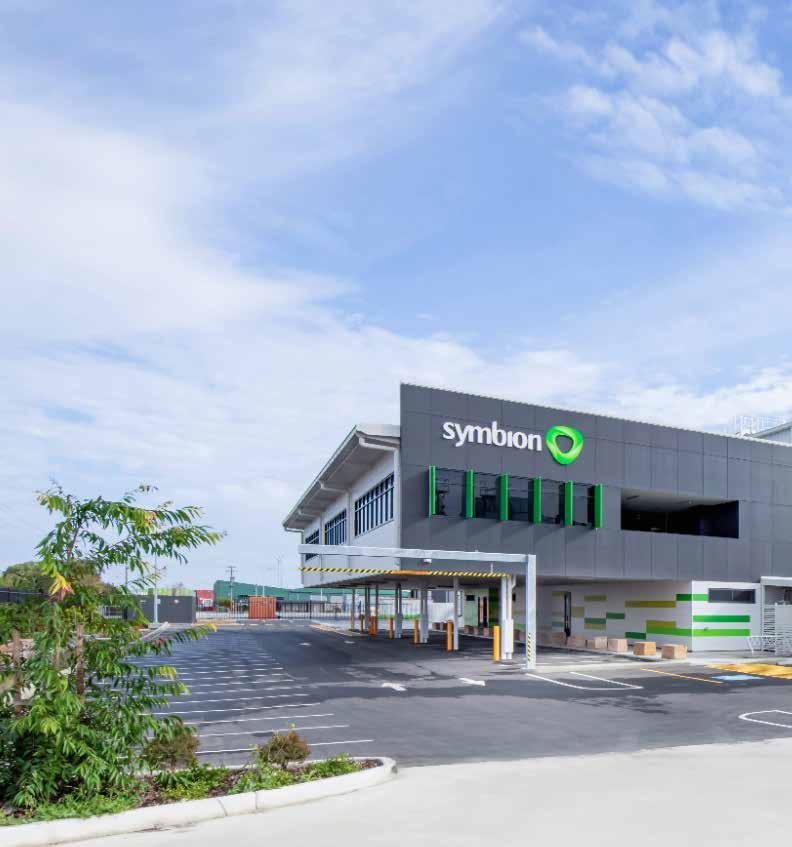
end user of medicine in the pharmaceutical supply chain.
This is why investing in warehouse automation is critical for achieving the best outcomes for your business and your clients.
Symbion: A fully integrated automated warehouse
Take the case of Symbion, an Australian healthcare products wholesaler.
A wholly-owned subsidiary of the EBOS Group Limited (EBOS), Symbion distributes medicines to pharmacies and hospitals, always knowing there is a patient or consumer with medical needs at the end of the chain.
Right before the COVID-19 pandemic, Symbion opened its 9,500 m2 warehouse and distribution center in Brisbane, Australia,
that leverages SSI SCHAEFER’s cutting-edge automated warehouse solutions. At full capacity, the warehouse can manage up to 20,000 SKUs and up to 85,000 orders per day.
The warehouse was designed to ensure that Symbion is ideally positioned to support the future needs of Australia’s changing healthcare market and serve patients effectively.
Recognizing the fast-paced, highly competitive environment Symbion operates in, SSI SCHAEFER designed an integrated, bespoke automated warehouse solution which is flexible, scalable, and viable.
The system enables Symbion to process 9,000 orders a day, with only 45 minutes between order receipt and shipment.
For EBOS’ Executive General Manager for Strategic Operations & Innovation Simon Bunde, SSI SCHAEFER’s system stands out for its simplicity and robustness. He said, “Scalability and flexibility are a key part of the design process and the way we lay it out anticipates the future needs of the business. One of the key benefits for us is that we can do a number of roles from a single technology. We have access to all the products that we can call out in any sequence at very high speeds.”
Featuring a single-level shuttle system spanning over five aisles and utilizing 100 SSI Cuby shuttles across 1,500 m2 of floor space, the SSI Cuby is arranged in a patented 3D-MATRIX Solution.
Health and safety are a priority for Symbion. Therefore, the company has invested in high-performance, ergonomically optimized goods-toperson two-level Advanced Pick Stations where storage load carriers and picking load carriers are at the same height. This improves picking performance of up to 1,000 units per hour and helps Symbion reduce picking errors.
Using a 3D-MATRIX Solution design for storage and picking enables seamless

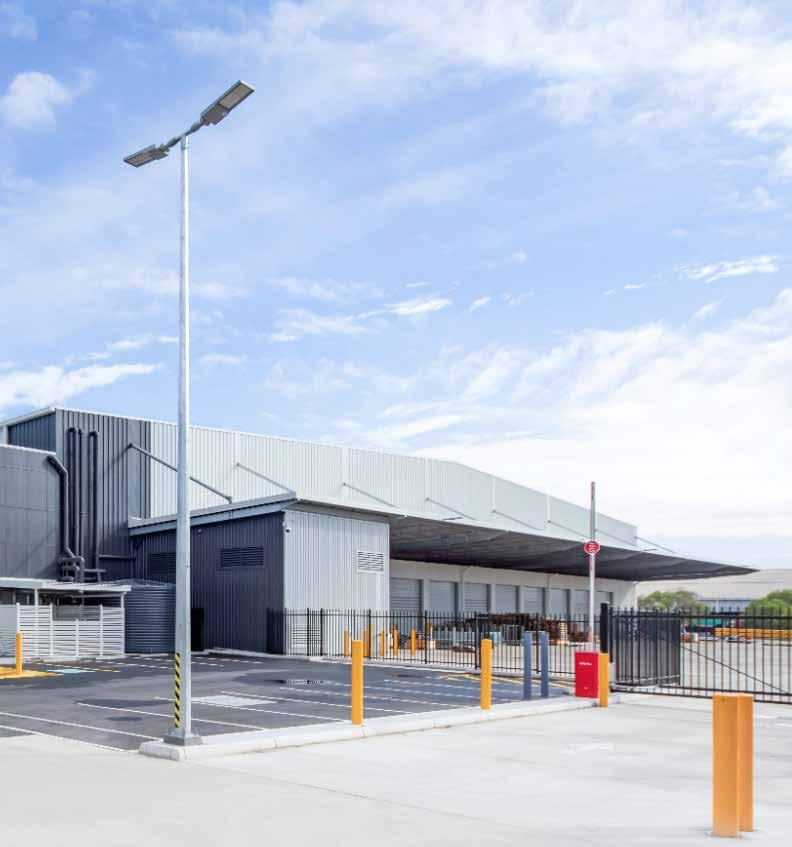
Simon Bunde, Executive General Manager for Strategic Operations & Innovation, EBOS Group Limited
delivery of any bin to any pick station, significantly enhancing picking efficiency and operational flexibility. This innovation reduces order processing time and improves stock accessibility, allowing for the maintenance of minimal stock levels and a broader SKU range.
Additionally, the warehouse features a 60 m long automated order picking solution. The SSI SCHAEFER A-Frame is built to rapidly process multiple orders, even under peak loads. At Symbion’s Brisbane warehouse, the A-Frame is restocked by 1,500 configurable product channels and is replenished through adjacent carton live storage bins, which are automatically replenished by SSI Cuby shuttles.
It is also the first facility in Australia to feature SSI SCHAEFER WEASEL automated guided vehicles (AGV). The WEASEL can transport cased and binned goods across a pedestrian walkway to ensure maximum space utilization and minimal disruption to Symbion staff. Unlike other AGVs, the WEASEL does not require numerous sensors or a complex control system.
Maintaining the integrity of medicines is paramount for any healthcare and pharmaceutical organization. In the case of Symbion, SSI SCHAEFER has installed robust security and storage arrangements for fridge lines, dangerous goods, and specialty medicines. A vault has been installed for controlled and dangerous medicines, and there are refrigerators to store medicines to maintain their efficacy.
Symbion’s warehouse and distribution center in Brisbane, Australia
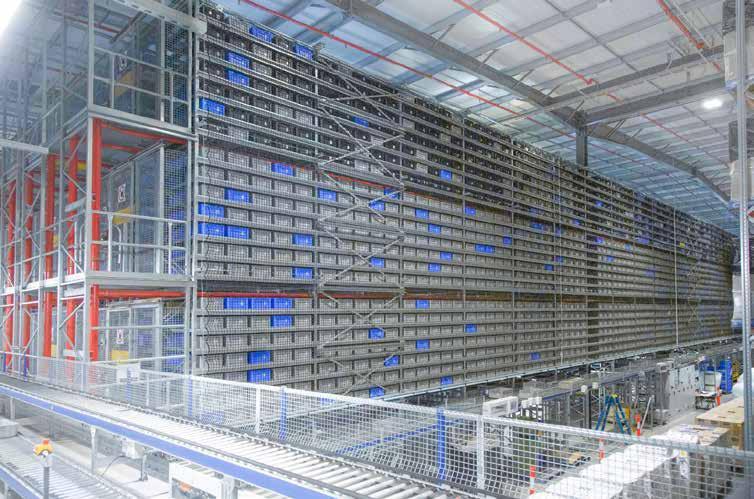

Furthermore, the order finishing area is equipped with strapping machines, lid closing machines, document drops for various shipping documentation, and outbound despatch ramps. The incoming goods area features automatically supplied decanting stations and a tare scale to ensure loading accuracy and tolerance checking.
You might be wondering how all these technologies at Symbion’s warehouse are being controlled. Are they integrated into a single software or functioning independently of one another?
The answer: Symbion leverages SSI SCHAEFER’s in-house warehouse management system WAMAS for all its automated solutions.
A comprehensive, 360-degree suite of solutions, the WAMAS modules and solutions can be implemented based on the customer’s requirements at that point in time, allowing room for scalability as the business grows.
To ensure a seamless go-live and smooth ramp-up, the system underwent rigorous testing in collaboration with Symbion. Leveraging extensive system emulation and innovative real-order picking simulations, SSI SCHAEFER tested the entire system at full capacity with real products. With a focus on precision and accuracy, SSI SCHAEFER successfully launched the system for Symbion.
As with any intralogistics solution, it is crucial to optimize system performance. In Symbion’s case, SSI SCHAEFER’s service engineers are located on-site to ensure close collaboration with the Symbion team and undertake maintenance and repair work immediately.
Automation in the warehouse has substantially reduced lead times for companies like Symbion. There is much more to gain from investing in automation today.
From e-commerce to pharmaceuticals, SSI SCHAEFER has a strong track record
in helping companies around the world, including in the Middle East, address their supply chain needs through automation. Through software integration such as SSI SCHAEFER’s WAMAS warehouse solutions or an automated storage and retrieval system (ASRS), every solution is customized to align with the customer’s goals, demands, and requirements.
For SSI SCHAEFER, it is about working with customers such as Symbion in a collaborative manner before devising a solution. Bunde shared, “It’s quite amazing to see what sort of solutions teams can come up with through collaboration and having interesting and challenging debates about real world problems that we try to solve. We were collectively quite innovative in the way we approached it.”
Bunde added, “SSI SCHAEFER tries to understand how they can help us and make things better. Throughout the way, we had some very meaningful dialogues about how to do it and what the key risks were, and [the system] is a testimony to the teams that worked together. We are very pleased that we can work with partners like SSI SCHAEFER to find solutions that work for us.”
It is time to make an investment to make the best out of your warehouse. Automation allows businesses like yours to optimize costs, rapidly adjust to market conditions, and increase the efficiency of your material flow. To automate your warehouse contact: https://www.ssi-schaefer.com/en-ae/aboutus/contact-us
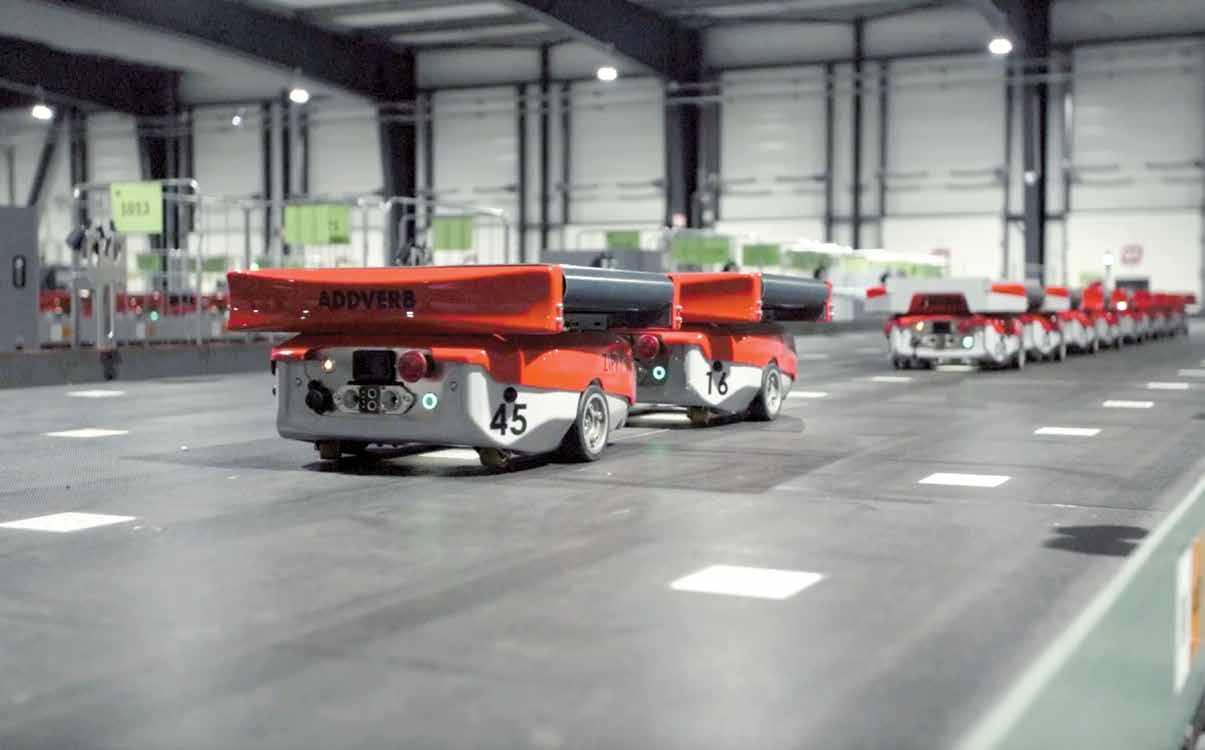
Zippy, Addverb's high-speed robotic automatic sorter for enhancing operations by sorting SKUs or items thus ensuring fast, accurate and cost-efficient operations without human intervention. Also, used effortlessly adapting to demand surges in warehouses.
THROUGHPUT
2.5 m/s PAYLOAD UP TO 40 KG
20,000 Sorts/Hour/System

Hellmann Healthcare Logistics plays a significant role in the healthcare supply chain within the IMEA (India, Middle East, and Africa) region. They provide specialised logistics solutions tailored to the healthcare and pharmaceutical industries.
In Dubai, Hellmann operates a 100,000 sq ft multi-user Healthcare Hub approved by the UAE Ministry of Health. This hub offers storage solutions for frozen, refrigerated, and ambient-controlled products and manages regional distribution by air, road, and sea. Peter Delkuti, Strategic Account Director - IMEA – Healthcare, Hellmann Worldwide Logistics offers a detailed insight into these seamless operations.
GSC: Can you tell us about Hellmann Healthcare Logistics in the IMEA region and its role in the healthcare supply chain?
PD: Hellmann Healthcare Logistics plays a vital role in the healthcare supply chain across the IMEA region by offering comprehensive logistics solutions tailored for pharmaceutical and medical device companies. We focus on ensuring the safe, compliant, and efficient transportation and storage of healthcare products within diverse and complex markets. Our services in the IMEA area encompass everything from temperature-controlled storage to timely deliveries, all while adhering to strict regulatory standards and safeguarding product integrity throughout the entire supply chain.
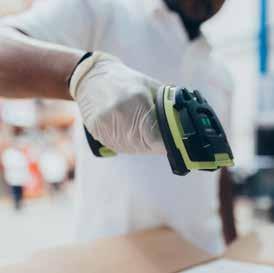

GSC: What are some of the key features of Hellmann’s healthcare distribution facilities in the IMEA region?
PD: In Saudi Arabia, Hellmann offers comprehensive storage and distribution services that cover the entire Kingdom. Our joint venture, Hellmann Calipar Healthcare Logistics, operates a state-of-the-art regional distribution hub in the UAE. This facility serves as a strategic gateway for the Middle East and Africa, enabling faster distribution and solidifying our presence in the healthcare sector. We provide unique value-added services to our customers, including aggregation, redressing, labeling, imprinting, or cryogenic storage. Our healthcare distribution centres in the IMEA
region are built to uphold the highest global standards. We hold certifications in GDP/GSDP, ensuring our operations meet stringent quality benchmarks. Our facilities feature multi-temperaturecontrolled zones, accommodating ranges from +15°C to +25°C, +2°C to +8°C, and options for frozen storage. Additionally, we have dedicated areas specifically designed for controlled and high-value pharmaceuticals. To enhance security and efficiency, we provide 24/7 monitoring and real-time temperature tracking. Our advanced warehouse management systems (WMS) play a crucial role in maintaining accuracy and optimising inventory management.

GSC: How does Hellmann maintain compliance with varying regulatory standards across different countries in IMEA?
PD: Hellmann secures compliance across the IMEA region by positioning dedicated regulatory affairs and quality assurance teams in every country where it operates. These teams constantly monitor and update internal processes to ensure alignment with the latest regulatory changes. In addition, Hellmann conducts regular audits and provides ongoing GDP and GSDP training to employees and partners, reinforcing a culture of quality and compliance. The company also collaborates proactively with local health authorities to uphold the highest standards of best practices throughout its healthcare logistics operations.
GSC: What innovations has Hellmann introduced to enhance efficiency and reliability in healthcare logistics in the region?
PD: Technology plays a crucial role in Hellmann’s operations, serving as a foundation for achieving complete endto-end visibility through advanced track and trace and smart visibility systems. These systems not only offer real-time insights into the movement of goods but also boost supply chain transparency. Additionally, the adoption of automated warehouse management solutions, along with cutting-edge RFID technologies, greatly enhances inventory accuracy,
minimizing discrepancies and ensuring that products are available when needed. Hellmann also places a high priority on compliance and maintaining quality standards by utilizing digitally documented processes, which simplify auditing and verification while reducing the chance of human error. One particularly exciting area of focus is the integration of predictive analytics and artificial intelligence. We’re exploring options to empower the company to anticipate potential disruptions in the supply chain, allowing us to take proactive measures that mitigate risks and optimize route planning for greater efficiency.
GSC: What role does technology play in Hellmann Healthcare Logistics’ operations and supply chain management?
PD: Technology enhances healthcare logistics by improving visibility, efficiency, compliance, and risk management across the supply chain. Lane Risk Assessment helps identify and mitigate potential transportation risks, ensuring product integrity. Ground Handling Visibility prevents delays and mishandling, maintaining cold chain compliance. Supply Chain Risk Management strengthens reliability by proactively addressing disruptions. CAPA Management enhances quality control by preventing recurring issues and ensuring regulatory compliance. Automation Telemetry Connectors provide real-time monitoring of temperature
and environmental conditions, allowing immediate corrective action. Finally, Transportation Management Systems (TMS) optimize shipment planning and execution, reducing transit times and improving delivery performance. These digital solutions collectively enhance patient safety, operational efficiency, and supply chain resilience.
GSC: What sustainability initiatives has Hellmann implemented in its healthcare logistics processes?
PD: Hellmann Worldwide Logistics is committed to developing sustainable logistics solutions. Eco-friendly transportation focuses on optimizing routes through transportation management systems, which significantly cuts down on fuel consumption and emissions. In warehousing, energy efficiency is key; this can be achieved by adopting technologies like LED lighting and motion sensors that save energy. To minimize waste, businesses should make use of recyclable, biodegradable, and reusable packaging materials. When it comes to cold chain efficiency, utilizing advanced insulation and energy-efficient refrigeration systems is crucial for lowering energy consumption. Additionally, employing IoT devices to monitor temperature-controlled shipments helps avoid waste from temperature fluctuations. Finally, reducing the carbon footprint involves measuring and reporting carbon emissions within logistics operations.
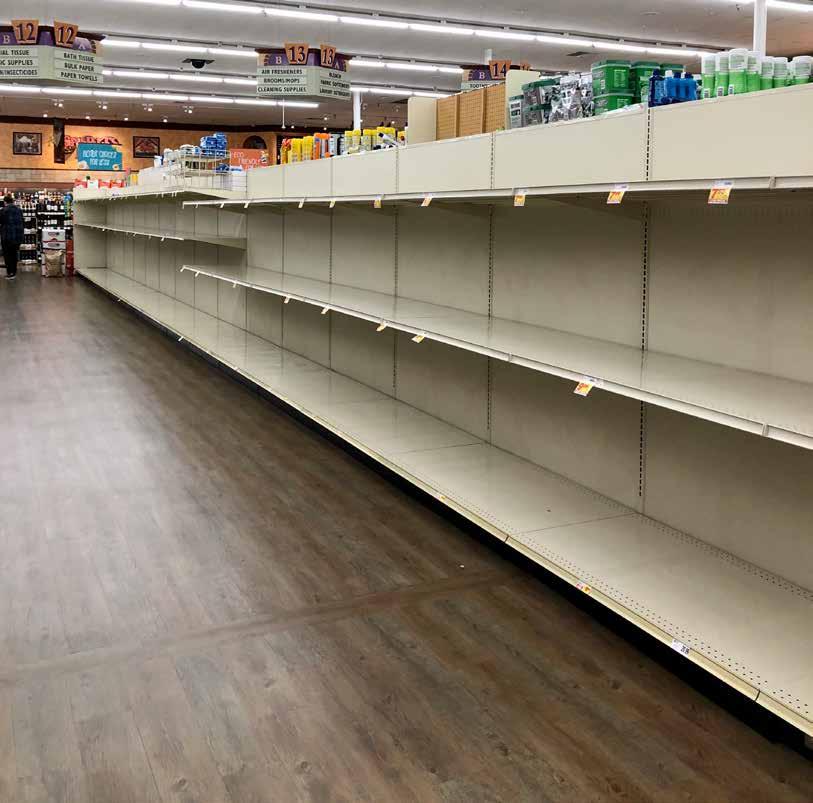
In supply chain management, stockouts are often seen as an unavoidable reality, a natural byproduct of volatile demand and supply chain disruptions. Many industry professionals accept them
as
part of doing business. But do we truly understand the full impact they have? Mieke Grashuis, Technical Consultant, Slimstock.
Major retailers like Walmart are familiar with stockouts as well and notice the significant impact these stockouts have. In 2014, the company lost nearly $3 billion in potential sales due to out-of-stocks (Rosenblum, 2014). Instead of simply accepting this loss, Walmart took action. By improving its planning processes, the company managed to reduce stockouts by 16%, ensuring that fewer sales were lost the following year.
But how many planners take a step back to truly assess the cost of stockouts and the factors driving them? Recognising stockouts not as an unavoidable cost of business but as a solvable challenge can shift the way retailers approach inventory management.
The customer’s reaction: what happens when stock runs out?
A study of Corsten and Gruen (2004) reveals that customers react in four different ways when faced with a stockout. Some may substitute the item with a similar product or wait until it’s back in stock, responses that may have a limited impact on the business. However, the other two reactions can have serious consequences: part of your potential customers will abandon their purchase entirely. And a significant part will go directly to a competitor to buy the product in their store.
These results show that a customer might be way less loyal than a retailer might think. This reaction results in a 100% loss of margin on these potential purchases and severely damage customer trust.
The first and most apparent cost of a stockout is the missed revenue opportunity. Research shows that stockouts lead to an average of 4% in lost sales (Corsten & Gruen, 2004). In 2021, CPG (Customer Packaged Goods) retailers even lost 7.4% of their sales due to stockouts (NielsenIQ, 2022).
Beyond the topline impact, stockouts also come with operational costs. Expedited shipping, last-minute orders, and the scramble to recover availability can add up quickly, eating into margins. While these costs are measurable, the intangible damage to your brand and customer trust can be even more significant.
Given these risks, the cost of preventing stockouts, through better inventory practices and proactive investments, might be far more worthwhile than many retailers assume.

Stockouts often seem to be caused by external factors like demand spikes, supply chain disruptions, or global events. However, a deeper look reveals that 72% of stockouts are rooted in manageable planning issues (Corsten & Gruen, 2004). When looking at the root causes of the planning issues companies face, the following are often underlying reasons for stockouts:
• Legacy Systems: Many companies still rely on outdated legacy systems that were designed for static planning processes. These systems struggle to adapt to modern inventory challenges, making it difficult to optimise stock levels effectively.
• Human Bias in Ordering: When ordering decisions are influenced by personal judgment rather than data, it often leads to imbalances, either overstocking, which ties up capital, or stockouts, which result in lost sales and dissatisfied customers.
Purchase item from competitor Substitute or wait until item is available Abandon purchase
• Decentralised Ordering Process: When store managers handle ordering independently, it takes away valuable time that could be spent assisting customers. Additionally, without standardised processes and centralised data management, companies face inconsistencies in inventory records, leading to inefficiencies across the business.
Even in centralised systems, flaws in purchase order planning, such as static order policies or poor data quality, can leave retailers unable to respond effectively to changes in demand.
Meanwhile, the remaining 28% of stockouts are tied to supply chain planning challenges. These can include mismanaged shelf space, poorly aligned product introductions, or external disruptions, factors that can be mitigated with proactive, data-driven planning.
To minimise stockouts, companies can focus on several key areas that drive immediate impact:
1. Refine Demand Planning: Cleanse demand history of outliers, classify items to apply the right forecasting methods, and enrich forecasts with external inputs where needed.
2. Enhance Forecasting with AI: Modern AI-driven algorithms can improve accuracy beyond conventional forecasting techniques.
3. Take a Data-Driven Approach to Ordering: Limiting human bias ensures more balanced inventory levels and reduces both overstocking and stockouts.
4. Prioritise Service-Level-Driven Inventory Management: Instead of relying on fixed days of cover, dynamic safety stocks help maintain the right balance between availability and efficiency.
5. Centralise Replenishment: Standardised processes improve efficiency, reduce errors, and free up store managers to focus on customers.
Stockouts may be a familiar challenge for retailers, but they are far from an unavoidable reality. By understanding the true cost of stockouts, not just in terms of lost sales but also the long-term damage to customer trust and competitive positioning, retailers can begin to see them as a solvable problem rather than an inevitable consequence of doing business. By embracing a segmented, data-driven approach, retailers can achieve the delicate balance between minimising stockouts and avoiding overstocking. The result? Stronger customer relationships improved financial performance, and a competitive edge in the market.
Empty shelves don’t have to be the norm. With the right strategy, they can become a thing of the past. References: - Corsten, D., & Gruen, T. W. (2004). Stock-Outs cause walkouts. Harvard Business Review, 82(5), 26–27. - NielsenIQ. (2022, February 9). CGP retailers lost out on 7.4% in sales to Stock-Outs in 2021. Food Manufacturing. - Rosenblum, P. (2014, April 15). Walmart’s out of stock problem: Only half the story? Forbes.

Your sales team is losing deals every day— and you’re letting it happen. Right now, as you read this, your competitors are closing deals that should have been yours. Not because they have better rates. Not because they provide better service. But because they understand something that most logistics companies are still ignoring - sales has changed, and the industry is still stuck in outdated tactics. Jessica Panigari, Founder and Strategy Leader of Goods2load offers a perspective on how to counter this.
You can have the most reliable network, the strongest relationships, and the best service. But none of it matters if no one can find you. The reality? Every day your company isn’t visible online, it’s losing business.
Logistics sales in 2025What no one wants to admit
For years, logistics sales teams have relied on the same manual methods: Cold calls that go unanswered emails that never get a reply. Expensive trade fairs with
unpredictable returns time consuming negotiations that don’t always convert. Hiring new employees, training them, and watching them underperform—costing more than they generate The problem? The buyers have moved on. They expect fast, seamless digital solutions. They search online, compare options instantly, and choose providers they can access without delay. If they don’t find you, they go to the next available option. That’s lost revenue, lost market share, and lost future opportunities.
Still not convinced? Let’s look at what happens when logistics companies refuse to evolve: Missed Opportunities: Every cold call that gets ignored isn’t just a rejection— it’s a potential long-term client choosing a competitor instead. Wasted Resources: Trade fairs and networking events can be valuable, but they drain time and money with no guaranteed ROI. Sales Team Burnout: Asking your salespeople to fight an uphill battle
with outdated methods leads to frustration, lower morale, and higher turnover rates.
Lack of Predictability: Traditional sales efforts don’t scale efficiently. They rely on personal effort rather than smart, automated lead generation. It’s not about working harder.
It’s about working smarter. Goods2Load builds the track for you, removes the hurdles, and gives your best horses the arena to dominate.
• Automated Lead Generation – Stop chasing clients. Let them come to you.
• 24/7 Digital Visibility – Be seen by businesses searching for logistics services worldwide, even while you and your team are sleeping.
• Passive Revenue Streams – Convert digital traffic into consistent sales.
• Data-Driven Targeting – Focus on highpotential clients instead of wasting time on dead-end leads.
Privacy in deal closures – Goods2Load doesn’t di0splay price comparisons or add fees to each transaction. You can close deals privately without worrying about competitors lowering their prices to win business, even if they can’t offer the same service quality.
Goods2load is not another listing platform or directory. This is a fully integrated digital sales engine for logistics companies you can make in 10 minutes. And just like in racing, those who don’t adapt to the new track will be left behind, watching others take the prize.
The logistics industry is changing faster than ever. Buyers are moving online— they expect fast, transparent, and digital solutions. AI and automation are redefining efficiency, making outdated sales tactics obsolete. The companies that embrace digital transformation will dominate the market.
There is no “wait and see” option. The market will not slow down for those who refuse to adapt.
Adapt and dominate, or get left behind. This is the moment where companies either adapt and dominate—or get left behind.

Goods2Load is free until May 1st for the first 25 companies onboarding in 2025. Your competitors are already making their move. This opportunity will not come twice.
The logistics industry is at a turning point. The companies that recognize this shift and position themselves for the future will take the lead. Goods2Load isn’t just a tool—it’s your ticket to the next era of logistics sales. Don’t let your sales team run in circles on an outdated track. Give them the power to win the race. The time is now.
Panigari is an entrepreneur with deep expertise in wholesale and logistics. Her experience helped her understand global market trends and the impact of logistics on SMBs. As the founder of Goods2Load, she is transforming the industry by profiling, centralising, and digitising a disrupted sector— making logistics more efficient, accessible, and understandable for emerging entrepreneurs.
In today’s dynamic and fast-evolving supply chain landscape, the role of a robust and agile Warehouse Management System (WMS) in 3PL (third-party logistics) operations is more critical than ever. With the demand for faster fulfilment times, higher customer expectations, and the constant pressure to reduce costs, choosing the right WMS is crucial. But with so many options available, selecting the right one for your business can be overwhelming.
By Engr. Noman Ali, Founder & CEO, Supply Chain Talks
We delve into the key aspects to consider when selecting a WMS for 3PL operations, key features that make a WMS agile and robust, and how consultants play an essential role in helping organisations make the right choice.
For 3PL providers, efficiency is king. A WMS is the backbone of your warehouse operations, streamlining everything from inventory tracking to order fulfilment, labour management, and beyond. Choosing the right system can help you optimise operations, scale effortlessly, and improve your service quality. Conversely, selecting the wrong WMS can lead to inefficiencies, wasted resources, and even lost clients.
Let’s break down the most critical factors to keep in mind when making this important decision.
One of the most important factors to consider when selecting a WMS for 3PL operations is scalability. The nature of the 3PL business involves fluctuating volumes, the onboarding of new clients, and managing multiple locations. Your WMS should be capable of scaling as your business grows, allowing you to handle increased complexity without overhauling your entire system.
A scalable WMS will be able to grow with your business, supporting more warehouses, clients, and workflows as needed. You should ask yourself: Can this WMS support my business if we double in size over the next five years?
Imagine a 3PL company managing cold storage and handling fast-moving consumer goods (FMCG). As the business grows and the volume of clients increases, a scalable WMS will adjust to accommodate higher SKU counts, varied inventory types, and multi-location logistics without slowing down.
In the 3PL world, no two clients are the same. Different clients come with distinct storage needs, ranging from cold storage for perishable goods to oversized items and hazardous materials. A flexible and customizable WMS allows you to configure workflows, reporting, and operations to meet your clients’ unique requirements.
Your WMS should also offer customisable features like tailored dashboards, reports, and order management options. This ensures that you can provide each client with the specific data and functionality they need to run their operations smoothly.
Integration capabilities: seamless connectivity across systems
For 3PL providers, seamless integration with other systems—both yours and your clients’—is vital. A WMS should integrate effortlessly with your existing ERP, Transportation Management Systems (TMS), and other supply chain technologies. The ability to share data between systems in real-time ensures accuracy, reduces the need for manual data entry, and minimises human errors. Additionally, your WMS must be capable of integrating with your clients’ systems, providing them with visibility and control
over their inventory. Whether through APIs or built-in connectors, this integration feature enables smooth communication across platforms and ensures optimal operational performance.
Real-time visibility is a critical feature that every modern WMS should offer. In a 3PL environment, having real-time data on inventory levels, order statuses, and shipment tracking is essential for optimizing daily operations and making proactive decisions.
This capability empowers you to track orders, forecast inventory, and resolve issues before they impact your customers. A WMS with real-time reporting and visibility can give your clients the transparency they expect while allowing you to monitor your warehouse’s performance in real-time.
For instance if a sudden surge in demand occurs, real-time visibility ensures that you can adjust staffing levels, replenish inventory, and manage transportation efficiently to meet the increase.
Even the most powerful WMS is only as effective as the people using it. That’s why support and training are key factors in selecting the right WMS for your 3PL operations. The provider should offer comprehensive onboarding and ongoing support to ensure that your team can use the system effectively.
Proper training and support will help your team troubleshoot issues, implement new features, and adapt to any operational
changes as your business evolves. Make sure the WMS provider has a strong reputation for customer support and offers resources like online training modules, dedicated support teams, and regular updates.
An agile and robust WMS must be capable of adapting to changes and scaling to meet future demands while maintaining operational efficiency. Here are some key features that are critical to an agile and highperforming WMS:
- Cloud-Based Deployment: Cloudbased WMS systems are increasingly popular due to their flexibility, scalability, and accessibility from any location. They offer faster implementation, reduced IT costs, and regular updates without the need for hardware investments.
- Multi-Client Management: For 3PL providers managing multiple clients with different needs, the ability to handle diverse workflows, billing models, and reporting for each client in a single system is essential.
- Mobile-Friendly Features: Mobile access to the WMS, through apps or responsive design, allows warehouse staff to scan items, track inventory, and manage orders on the go, boosting efficiency.
- Automation and AI Integration: Integrating automation tools like barcode scanners, RFID tags, and even AI-driven forecasting or picking systems can streamline operations and reduce human error.
- Advanced Reporting and Analytics:
A robust WMS should offer customizable reporting options that allow users to generate insights on productivity, inventory levels, order accuracy, and more, helping management make data-driven decisions.
Choosing the right WMS is a complex process that involves understanding your specific needs, evaluating multiple vendors, and ensuring that the solution you choose can scale with your business. This is where the role of consultants becomes invaluable.
1. Tailored recommendations based on your needs
Consultants can conduct an in-depth analysis of your current processes, workflows, and pain points to recommend a WMS that is perfectly suited to your business. They will ensure that the system aligns with your existing infrastructure, integrates seamlessly with your other platforms, and provides the functionality required for your unique operations.
2. Vendor evaluation and negotiation
WMS consultants have extensive experience working with various WMS vendors. They can help you navigate the crowded marketplace, shortlist potential vendors, and evaluate the
systems against your needs. They will also assist in negotiating contracts, pricing, and service-level agreements to get the best possible deal.
3. Implementation and change management
Implementing a new WMS is no small feat. Consultants can manage the entire implementation process, ensuring that the system is deployed smoothly, with minimal disruption to your business. They also offer change management support, ensuring that your team is fully trained and that the transition to the new system is as seamless as possible.
Choosing the right WMS for your 3PL operations is a crucial decision that can significantly impact your business’s efficiency, scalability, and customer satisfaction. By focusing on factors like scalability, flexibility, integration, real-time visibility, and support, and by considering the key features that make a WMS agile and robust, you can make an informed decision that drives long-term success.
Noman Ali is a seasoned expert in supply chain management, with over 20 years of strategic and operational experience. Throughout his career, he has held pivotal roles in multinational firms across diverse industries such as pharmaceuticals, textiles, and FMCG. Companies like Unilever, Siemens, and Sanofi have benefited from his expertise. He is the Founder and CEO of Supply Chain Talks and Inv-X Technologies, offering consultancy, training, sustainability solutions and executive headhunting.

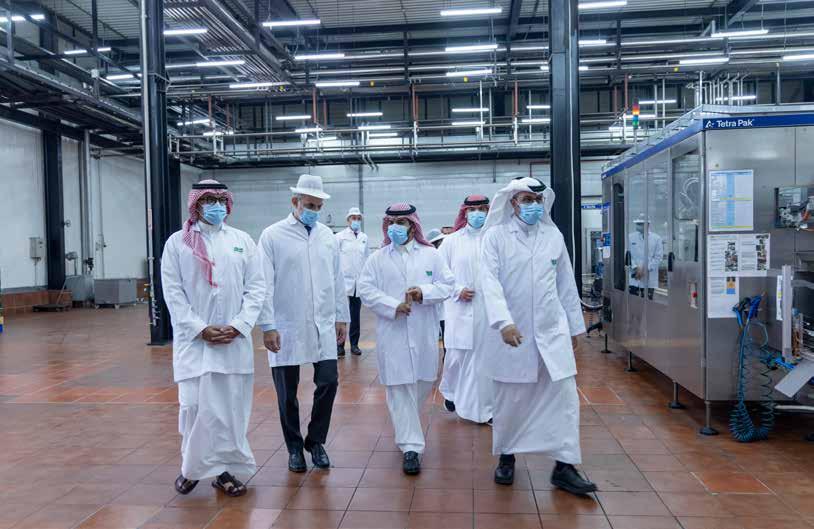
Tetra Pak and Al Rabie launched a significant project to modernise and digitise Al Rabie’s production facilities in Saudi Arabia, leveraging Tetra Pak’s innovative technology and sustainability initiatives.
Tetra Pak, a world-leading food processing and packaging solutions company, recently kicked off a significant project with Al Rabie, a leading Saudi player in juices, nectar, still drinks (JNSD) and dairy food products packaged in cartons, following an agreement that was signed recently. The major deal which will be implemented across three years, sets out to completely modernise and digitise Al Rabie’s production facilities by leveraging Tetra Pak’s innovative technology and sustainability initiatives in Saudi Arabia.
Having visited the Al Rabie production plant and witnessed the signing of the deal, H.E. Eng. Fahd Al Jubairy, Assistant
Deputy Minister for Sectoral Strategies and Regulations, MISA, added: “It is inspiring to see a Saudi company taking the lead in implementing cutting-edge technologies in the Kingdom. Their commitment to digitisation and next-generation technologies sets a remarkable example for the ongoing transformation of the industrial sector in the Kingdom.”
H.E. Petra Menander, Swedish Ambassador to Saudi Arabia, noted: “The cooperation we see today between a Swedish multinational company and a Saudi company marks a significant step towards sustainable development and cross country partnerships. I look forward to seeing more partnerships that mirror this collaboration.”
The project was officially launched by Chief Executive Officer of Al Rabie, Bassem Sabra and Managing Director of Tetra Pak Arabia Area, Konstantin Kolesnik.
The ambitious project involves a complete overhaul of Al Rabie’s production facilities to meet and surpass the latest industry standards with the ambition to be a “Next Generation Factory”. It aims to eliminate equipment obsolescence through maximising existing assets for optimal performance. It also seeks to digitalise the entire value chain for smoother operations, adopting Industry 4.0 technologies to support digital transformation and improve resource efficiency in line with Saudi Vision 2030.
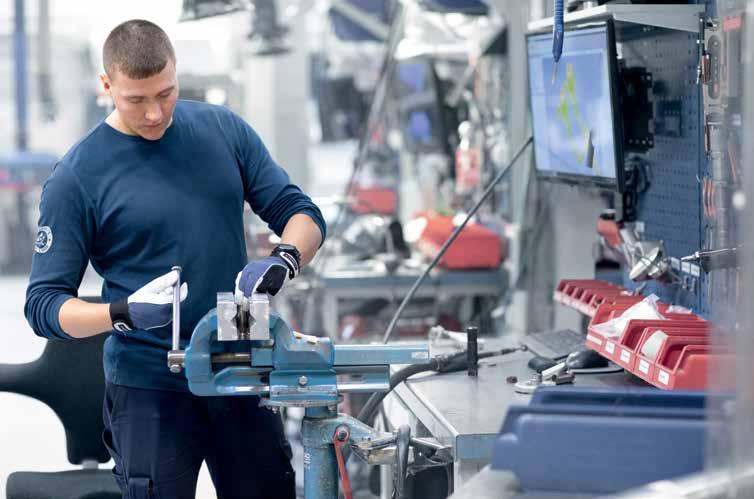
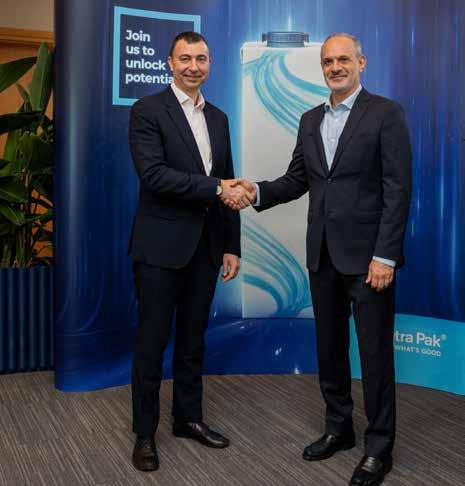
Modernising Al Rabie’s factory will save up to 36 million litres of water in cleaning operations annually and reduce electricity and utilities consumption, while increasing the plant’s production capacity. These measures will boost profitability and lower the environmental footprint of Al Rabie whilst also transforming the factory into a Tetra Pak centre of excellence.
Konstantin Kolesnik, Managing Director of Tetra Pak Arabia Area, said: “This agreement marks a significant advancement in our long-standing partnership with Al Rabie. Combining Tetra Pak’s global expertise with Al Rabie’s market leadership will elevate the food and beverage industry in Saudi Arabia. Our partnership aims to enhance product availability, consumer engagement, and overall market positioning, enabling improved traceability from ingredients to production processes.”
Bassem Sabra, Chief Executive Officer of Al Rabie, also expressed his enthusiasm for the deal: “This project affirms our commitment to top quality and innovation. Enhancing our production capabilities allows us to meet the evolving needs of our consumers and further contribute to Saudi Arabia’s food security and sustainability goals. Together, Tetra Pak and Al Rabie are on track to redefine the future of the food and beverage industry in Saudi Arabia, driving innovation, sustainability, and excellence.”
Al Rabie has been playing a pioneering role in co-developing the Saudi Arabian food and beverage market with Tetra Pak. Since their initial partnership in 1980, the two companies have paved the way for advancements in the food and beverage industry, introducing many innovations at the manufacturing and consumer levels.
· Enhancing water experiences: GROHE offers “Pure Joy of Water” thanks to a commitment to quality, technology, design, and sustainability.
· First GROHE Water Insights 2025 reveals Middle East consumers lead in water-scarcity awareness and the adoption of water-saving solutions; 72% and 60% respectively.
GROHE a global leader in complete bathroom and kitchen solutions, is set to redefine water experiences at ISH 2025 in Frankfurt. With a commitment to innovation, sustainability, and premium design, GROHE introduces cuttingedge solutions that align with the region’s growing demand for water conservation without compromising on luxury. From the revolutionary GROHE Rainshower Aqua Pure to the seamlessly designed Cubeo faucet range, the brand is enhancing water enjoyment while driving efficiency.
“In a region at the forefront of global water conservation, we see immense opportunity to drive meaningful change,” says Stefan Schmied, Leader, IMEA, LIXIL International.
The GROHE Water Insights 2025 survey, covering over 20,000 consumers globally, revealed that the Middle East (UAE, KSA, and Morocco) leads in water scarcity awareness and the adoption of water-saving solutions. While 72% of consumers in the Middle East respondents acknowledge water scarcity as a pressing issue, 80% prioritise water efficiency in their households, and 60% have already implemented water-saving fittings, significantly higher than in Europe or North America. With 68% in UAE believing that water efficiency in daily life is important to them, 51% surveyed also agreed to install a water-saving device in their household in the next six months.
Despite this awareness, water conservation remains an ongoing challenge. The survey highlights that perceived high costs and lack of information are key barriers preventing more widespread adoption. With bathing and personal hygiene consuming the largest share of domestic water, solutions that optimise water usage while ensuring an indulgent experience are critical for sustainable living in the region.
GROHE SPA’s newest offering, the Rainshower Aqua-Pure, aligns with the growing demand for wellness-centric bathroom solutions. Designed to transform everyday showers into a spa-like experience, this premium shower system features an advanced GROHE Aqua-Pure filter that removes chlorine and odors, delivering purified water that is gentle on skin and hair.
Available in an array of finishes from the GROHE Colors Collection, the Rainshower Aqua Pure is perfect for the region’s luxury hotels and high-end residences, where water quality and personal well-being are paramount.
For homeowners seeking effortless harmony in bathroom design, GROHE introduces the Cubeo faucet range. Inspired by the Perfect Match principle, Cubeo ensures a seamless aesthetic when paired
with the GROHE Tempesta shower system and Euro Ceramic line. The minimalist, softsquare design complements contemporary spaces, while its water-saving features cater to the region’s need for conservation. Built for longevity, Cubeo incorporates GROHE SilkMove technology for precise control and smooth handling, even after years of use. When combined with water-efficient fittings like the Tempesta shower system, which also features EcoJoy technology to reduce water consumption by up to 50%, Cubeo represents a perfect balance of affordability, durability, and sustainability.
Recognising the Middle East’s commitment to water conservation, GROHE continues to develop innovations that blend sustainability with luxury. The GROHE Rapido Heat Recovery shower system is a prime example, of recycling warm wastewater to reduce energy costs by up to 48%.

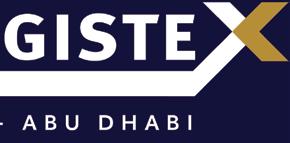
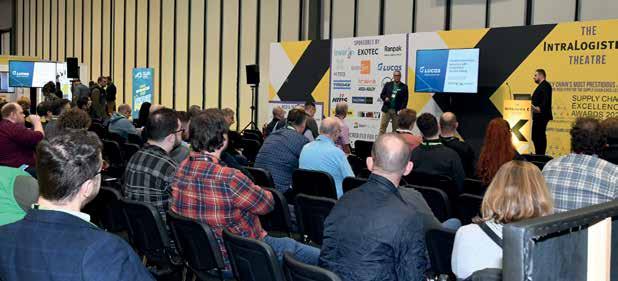






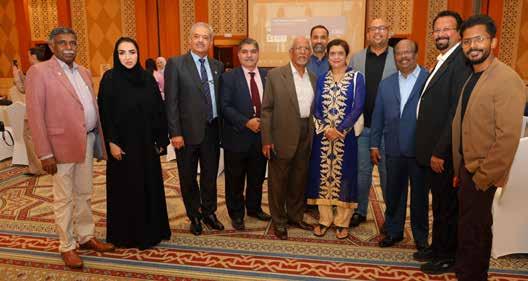
The NAFL hosted an intimate Ramadan iftar recently for its members and close associates. The event was held at the Grand Hyatt hotel in Dubai. The association was also happy to drop a reminder of the various logistics events that will be hosted in 2025.
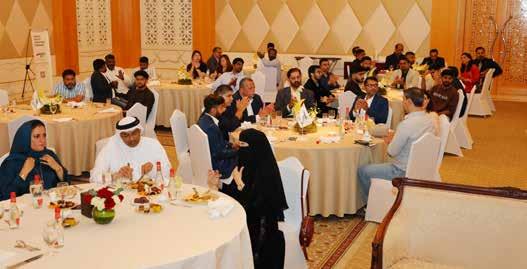
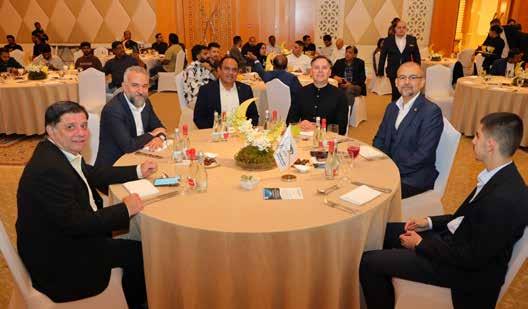

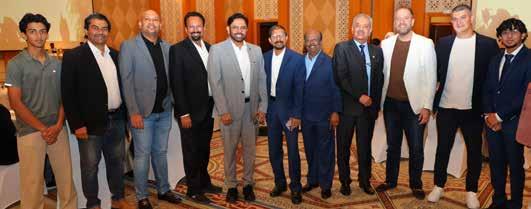

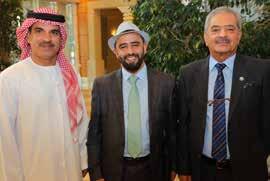
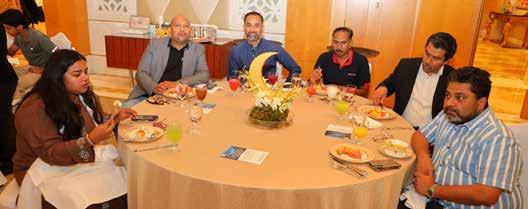

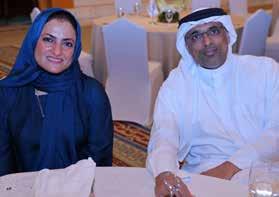



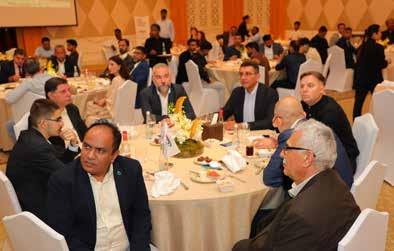
The frenzy of e-commerce megasales – Singles’ Day, Black Friday, Cyber Monday has become a global spectacle. But behind the scenes, these events expose a brutal truth: traditional logistics models buckle under the weight of consumer expectations. Promises of “same-day delivery” or “guaranteed stock” dissolve into delayed shipments, oversold items, and mountains of post-purchase returns.
For merchants, the stakes are existential. Inaccurate demand forecasting, misallocated inventory, and chaotic fulfillment don’t just dent profits – they erode brand trust.
The solution, however, isn’t simply throwing more humans or warehouses at the problem. The real gamechanger lies in something far less visible: algorithms that act as the nervous system of modern logistics, quietly optimising every decision from inventory placement to last-mile delivery.
For decades, inventory management relied on gut instincts and spreadsheets. Retailers either hoarded stock (tying up capital and risking obsolescence) or ran lean (inviting stockouts during demand spikes). The rise of AI-powered predictive analytics has disrupted this lose-lose cycle.
Take pre-sales forecasting. By analysing historical sales data, weather patterns, social media trends, and even regional purchasing behaviors, we now use algorithms predict demand. This allows warehouses to pre-position goods not just in the right quantity but in the right location – a tactic exemplified by Cainiao’s “pre-warehousing” strategy, which places best-selling items closer to high-demand zones before promotions begin.
But data’s true power emerges in its ability to learn. When a sudden TikTok trend sparks demand for an obscure product, modern systems adjust inventory redistribution in real time, preventing both
shortages and costly overstock. This agility transforms warehouses from static storage units into dynamic hubs that anticipate, rather than react.
From the hardware perspective, IOT devices build the foundation of the entire digital warehouse, from ubiquitous smart devices for personnel operations, automatic measurement, to AGV (Automatic Guided Vehicle), everything in warehouses is expressed digitally now.
However, logistics efficiency isn’t just about moving things faster — it’s also about cutting out waste wherever we can. Take packaging, for example. It used to be all about experience — to avoid the hassle of repacking, people would often go for bigger boxes, even if they weren’t the best fit. But AI is changing that.
Advanced computer vision systems now scan products, while algorithms analyse millions of data points — from item fragility to regional shipping regulations — to prescribe the optimal box size, packing sequence, and protective layout. A 15% average reduction in packaging waste using smart packaging tech, as seen in Cainiao’s experiences. It might seem small — until you scale it across millions of shipments and realise the amount of costs, materials, and waste it can save.
During mega-sales, loyalty members’ time-sensitive gifts often take priority—and AI makes sure of it. At our warehouses, smart algorithms stagger order processing, automatically batching shipments based on real-time merchant needs and platformspecific rules. High-priority orders—like VIP purchases or limited-edition drops—flow through automated workflows at top speed. Meanwhile, algorithms dynamically reroute shipments around bottlenecks—a typhoon in Shenzhen, a port strike in Rotterdam—so that “same-day” pledges stay intact.

Specialising in AI and logistics algorithms, he has over a decade of experience at Alibaba and Cainiao, driving AI-powered solutions to enhance supply chain efficiency. Zhang’s contributions have earned him multiple prestigious honors, including the CCF Science and Technology Award and the Wu Wenjun Artificial Intelligence Science and Technology Award.
Based on this, AI can optimise the end-toend process, from receiving, replenishment, inventory management, picking and packaging to optimizing operational efficiency. We can also use AI design the overall layout of the warehouse, and the entire warehouse operation process can be controlled by AI, to achieve the most efficient personnel arrangement and operation planning.
The next phase of e-commerce logistics won’t be just defined by flashy robots or drone deliveries. The real revolution is subtler: algorithms that turn chaos into predictability, waste into sustainability, and promises into guarantees. This isn’t about replacing the human element but enhancing it – ensuring that when a customer clicks “buy,” the gears of fulfillment turn invisibly, efficiently, and reliably.
For merchants, the message is clear: in the age of instant gratification, logistics isn’t a backend operation. It’s the frontline of customer trust.

Massimo Giannetto Integrated Business Planning Director AkzoNobel


Obaida AlSaggar VP of Procurement and Supply Chain Saudi Airlines Catering


Mohanned Badri Vice President Operations Performance Saudia Cargo


Mohamed Salah Dwidar Head of Supply Chain LVMH Beauty





Moghny Chief Supply Chain Officer Bin Awadh Alnaqeeb

Mohammed Al-Ghamdi Executive VP Manufacturing Jubail Chemical Industries Co

Mosaad Al Anazi Assistant Director, Corporate Logistic Ministry of National Guard Health Affairs

Ibraheem Alkahtani Head of Logistics & Trade Compliance Schneider Electric


Saadeh Group Vice President FBH GRP


Jade Marjurum Associate Director - Procurement MACE


Frederick Magana Head of Contracts & Commercial - Energy Sector NEOM


Saad Alqudsi Senior Supply Chain Manager - GCC Amazon

Organized by www.fortinusevents.com












Etihad Cargo hosted an elegant iftar for its business associates and partners. The event was held at the Louvre, Abu Dhabi. Some snapshots of the event.
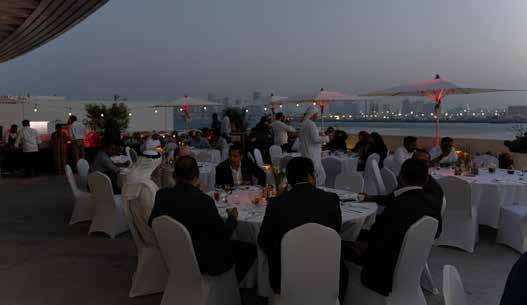





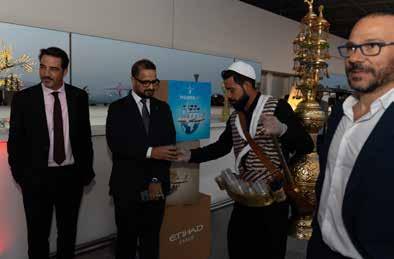





Turkish Airlines and Turkish Cargo organised an elaborate Suhoor for their business associates and friends from the industry. The event was held at Armani Hotel at the Burj Khalifa, Dubai. The backdrop of the beautiful Dubai Fountains and live Arabic music, made for a magical evening. We take you on a journey back to that euphoric night.













n The global supply chain and logistics industry witnessed a transformative event as Logistics Shakti, an Indian think tank focussing on transforming global logistics and supply chain, announced the curtain raiser for the SCM MIDDLE EAST Awards 2025. This exclusive event was held in Taj Business Bay, Dubai. It provided a preview of the grand conclave and awards set to take place on April 23-24, 2025, at the Grand Hyatt, Dubai.
The SCM MIDDLE EAST Awards 2025 was a landmark gathering, bringing together global leaders to shape the future of trade and supply chain management. The event brought together over 400 industry leaders including top CEOs, CXOs, and key policymakers from India, the UAE, and beyond. With a focus on the India-Middle East-Europe (IME) Corridor, the conclave fostered strategic discussions that delve into its immense potential and examine its transformative role in reshaping global trade routes, streamlining logistics networks, and strengthening economic ties between these key regions.
Kamal Narayan Omer, Chief Executive Officer & Co-founder of Logistics Shakti, shared valuable insights on the significance of the event, stating: “The SCM MIDDLE EAST Awards 2025 is more than just a platform, it is a movement towards a more connected, efficient, and resilient global
supply chain. Aligned with the spirit of G20 hosted in India which brought global leaders together to advance sustainable and resilient economic frameworks, this event will drive meaningful conversations, recognise industry excellence, and foster collaborations that redefine logistics and trade. As we explore the transformative potential of the IME Corridor, we look forward to engaging with leaders who are shaping the future of global commerce.”
Amit Shankhdhar, Managing Director and co-founder of Logistic Shakti stated: “This event serves as a crucial platform for industry leaders to collaborate, innovate, and drive the future of global supply chains. With a strong focus on the IME Corridor, we aim to explore its potential in redefining trade routes and enhancing connectivity.
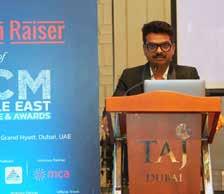
The discussions, insights, and recognitions at this forum will play a vital role in shaping a more efficient, resilient, and sustainable logistics ecosystem worldwide.”
The SCM Awards are a prestigious recognition of excellence in logistics and supply chain management, celebrating innovations that enhance industry standards and efficiency. The awards ceremony will spotlight organisations and professionals who exemplify leadership, performance, and creativity in supply chain operations.
All those in attendance will have a unique opportunity to engage with decision-makers, connecting with top executives who are shaping the future of logistics and trade. By positioning themselves at the forefront of critical supply chain discussions, participants can gain valuable insights, influence industry trends, and drive business growth through new collaborations and partnerships within the global logistics ecosystem.
Set against the backdrop of the Indian Prime Minister’s Gati Shakti initiative, Logistics Shakti is dedicated to revolutionising the sector by fostering innovation, enhancing infrastructure, and driving operational efficiencies. As the world navigates an era of rapid trade evolution, this conclave will serve as a catalyst for collaboration, policy-shaping, and sustainable growth in global logistics.

Dubai, UAE
15 - 17 April 2025
The IATA World Cargo Symposium, the largest and most prestigious air cargo annual event, comes back in Dubai, UAE, in April 2025.
The 2024 edition brought close to 2,000 delegates to Hong Kong (SAR), China. The next WCS will continue offering plenary sessions, specialized streams, workshops, and executive summits tackling aspects related to technology, innovation, security, customs, cargo operations, and sustainability.
Register now to join the WCS 2025 in Dubai!
Find out more at www.iata.org/en/events





The collaboration unveils the UAE’s next generation of electric trucks and buses. BYD introduces four gamechanging electric commercial vehicles, redefining urban logistics, freight, and sustainable public transport.
n Al-Futtaim Industrial Equipment has officially launched a bold new chapter in sustainable transport, partnering with BYD, the world’s leading electric mobility company. An extraordinary fleet of fully electric vehicles was unveiled at a spectacular event held in Dubai. The event brought together influential industry leaders, government representatives, media, and VIPs, marking a historic moment in the UAE’s green transformation of commercial transport.
The launch introduces four cutting-edge BYD electric vehicles, each engineered to disrupt the logistics, freight, and public transport industries:
-ETM6 Electric Truck – A powerful and dynamic urban logistics solution, powered by a 126 kWh battery for high-performance city operations.
-EV Light Truck T5 – The agile delivery hero, with a 132 kWh battery for efficient, eco-friendly urban deliveries.
-EV Medium Truck ETH8 – A heavyduty commercial workhorse, featuring a 255 kWh battery to take on the toughest transport challenges.
-B12 Electric Bus – A revolutionary public transport solution with a 425 kWh battery and an impressive range of 550 km, setting new standards for sustainable mobility.
“With the introduction of these electric vehicles, we’re not simply launching a new fleet—we’re accelerating the future of green mobility solutions in the UAE,” said Ramez Hamdan, Managing Director of Al-Futtaim Industrial Equipment. “The arrival of BYD’s electric trucks and buses is a key moment in the transformation of the commercial transport sector, enabling businesses to reduce their carbon footprint while enhancing operational performance.”
By embracing innovative electric
mobility solutions, Al-Futtaim Industrial Equipment is laying the foundation for a cleaner, smarter, and greener future in commercial transport.
This launch is not just about bringing electric vehicles to the UAE—it’s about leading the charge in reshaping commercial mobility and driving forward the UAE’s green revolution.
The event also highlighted AlFuttaim’Automotive’s ongoing commitment to supporting the UAE’s environmental goals through innovative zero-emission solutions. Ramez Hamdan, Managing Director of Al-Futtaim Industrial Equipment, emphasized:
“BYD’s fully electric trucks and buses are more than just advanced technology— they are catalysts for a shift in the transport landscape. These vehicles will help businesses reduce their carbon footprint while championing the UAE’s vision for a sustainable future.”
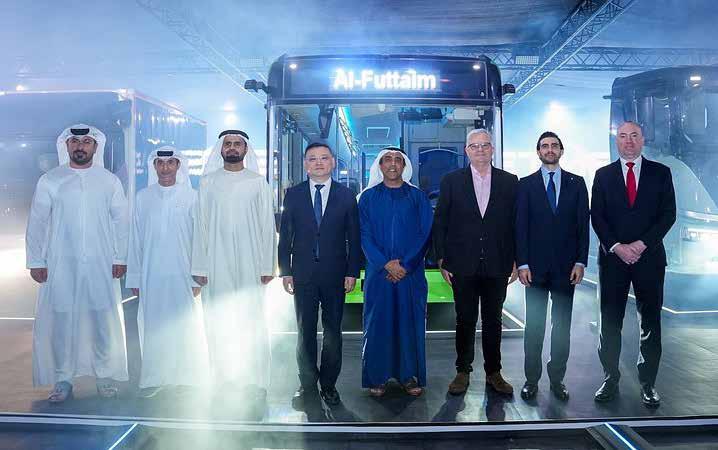
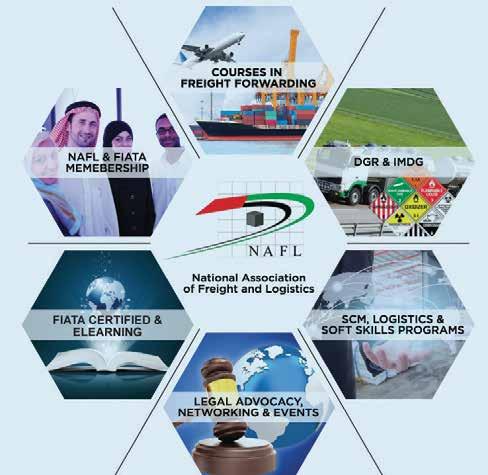

+ The FIATA member certificate
+ Use of the Fiata logo
+ Entry in the FIATA members directory & networking events




+ Advertising in the FIATA members directory, review and information (FIATA e-Flash)
+ Special Rates for FIATA publication and articles
+ Access to secretariat›s assistance
+ FIATA arbitration code
+ Use of FIATA documents
+ FIATA worldwide member connectivity
+ Talent Connect Worldwide, E-Learning

+ Discountes rates in participating in global and regional conferences
+ Asssistance in case of legal advocacy
+ Discounts for cargo/logistic events and exhibition stands
+ Discount training for NAFL members
+ Training/Certification for regional/international courses
+ Insurance at discounted rates (cargo/liability/medical)
+ Complimentary internship, Skill upgrade and Mentoring & Innovation ideas
+ Discounted supplier rates for industry products

n dnata, a leading global air and travel services provider, has been re-awarded the license to provide ground handling services at Zürich Airport (ZRH) in Switzerland. The extension follows a competitive public tender conducted by the airport operator, and secures dnata’s position at ZRH for another seven years.
dnata currently serves 40 passenger and cargo airlines in Zürich with a team of over 500 employees, safely handling over 35 aircraft turnarounds and 150 tonnes of cargo every day.
The company’s recent investments at the airport include the rollout of its digital cargo management system, One Cargo, which automates key business and operational functions, including safety and quality, reporting and ULD management, with an integrated, cloud-based platform. It also invested in advanced ground support

equipment (GSE), increasing the share of electric vehicles in its fleet to 42%.
In addition, dnata recently announced that it would boost its cargo handling capacity by over 50% at ZRH. Having signed a lease agreement with the airport authority, the company is planning to operate its new 9,500m² advanced warehouse facility as the sole occupant. The facility is already under construction and expected to open in early 2027.
Willy Ruf, dnata Switzerland’s Managing Director, said: “We are proud to have earned

n Federal Express Corporation (FedEx), the world’s largest express transportation company, has launched FedEx Surround in the United Arab Emirates (UAE), an intelligent solution for monitoring and intervention, designed to elevate logistics and supply chain management. Built on near real-time visibility, AI-powered predictive analytics, and advanced handling capabilities, FedEx Surround® provides businesses with unmatched shipment visibility, control, and reliability.
FedEx Surround predicts potential disruptions in the shipping process, allowing FedEx and its customers to swiftly make informed
the trust of Zürich Airport once again. The renewal of our license is a clear vote of confidence in our team, highlighting our reliability and commitment to service excellence. We will continue to invest in our people, infrastructure and equipment to deliver best-in-class services to our customers.”
Besides Zürich, dnata operates at Geneva Airport (GVA) in Switzerland. In 2024, dnata’s team assisted over four million departing passengers and moved over 103,000 tonnes of cargo in the country.
decisions. With three service levels—Select, Preferred, and Premium—the tools support a wide range of industries including healthcare, aerospace, automotive, and high-tech, providing critical updates and interventions that ensure the integrity and timely delivery of sensitive shipments.
“At FedEx, we are constantly innovating with data-backed intelligent solutions to meet the evolving needs of our customers,” said Nitin Navneet Tatiwala, vice president of Marketing and Air Network for FedEx Middle East, Indian Subcontinent, and Africa. “We are continuously learning from the millions of packages moving through our network each day – identifying patterns, trends, and cause-effect relationships – and using these insights to enhance our services in a more focused way. The launch of FedEx Surround is a game-changer for businesses relying on just-in-time delivery and critical shipments. It empowers businesses to smartly intervene in real-time, ensuring that shipments are not only monitored, but also actively managed to mitigate potential disruptions, enhancing decision-making, and ensuring peace of mind every step of the way.”
The launch of FedEx Surround aligns with the company’s broader commitment to support global commerce through smart innovation. Alongside this monitoring and intervention solution, FedEx offers a comprehensive suite of other digital tools, such as FedEx Delivery Manager, an interactive delivery solution that provides customizable delivery options and alerts, and the FedEx Import Tool, which simplifies the import process, enhancing efficiency, compliance, and the overall end-to-end shipment journey. These digital tools integrate seamlessly with the company’s existing wide range of shipping and tracking services.
n SolitAir, a Dubai-based air cargo carrier addressing middle-mile logistics demands, has appointed GAC Shipping (India) Private Limited as its cargo sales agent (CSA) in India.
GAC Shipping (India) Private Limited is part of the GAC Group, a global provider of shipping, logistics and marine services with more than 300 offices in over 50 countries worldwide. As SolitAir’s cargo sales agent, GAC will draw on its deep local market knowledge and extensive network of 28 full-fledged offices nationwide to provide comprehensive sales and marketing services to promote SolitAir’s cargo services in the Indian market.
Hamdi Osman, SolitAir’s founder and CEO, said: “Our partnership with GAC India marks a significant milestone in SolitAir’s growth strategy. India’s dynamic and rapidly expanding cargo market presents immense opportunities and GAC’s extensive experience, strong presence and commitment to excellence will be instrumental in strengthening our operations in this crucial market. We are confident that this collaboration will enable us to better serve our customers and capitalize on the growing trade between India and the UAE, particularly after the recent Comprehensive Economic Partnership Agreement (CEPA).”
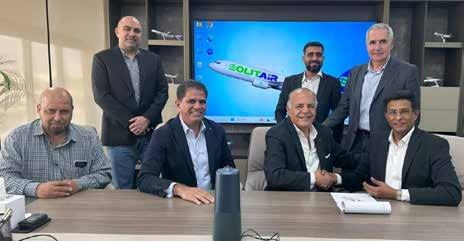
Ravi Ramachandran, Managing Director
- GAC India, added: “We are excited to welcome SolitAir to India with a big Namaste! “We look forward to representing the airline and promoting its services as their cargo sales agent. To do so, we shall work with the SolitAir team to develop and implement a bespoke marketing and sales strategy to penetrate key markets and win customers. Backed by a dedicated team of over 400 professionals, we are committed to offering the same high level of service that GAC is renowned for worldwide. We’re confident this partnership will drive growth for both SolitAir and our customers in India.”
SolitAir currently operates two narrow-
body Boeing 737-800 freighters, each with a 23-tonne capacity. A third freighter will join the fleet next month, supporting the company’s expansion plans into India, Bangladesh, key markets in Africa, the Stan countries, and other Middle Eastern hubs. The airline aims to connect over 50 cities within the Global South, within a six-hour flying radius from its Dubai World Central (DWC) headquarters.
By the end of 2025, SolitAir plans to add four more aircraft to its fleet and aims for a total of 20 aircraft by 2027. This expansion is well-aligned with the projected increase in trade between India and the UAE, which is expected to exceed $100 billion by 2030.
n The Dubai Centre for Family Businesses, which operates under the umbrella of Dubai Chambers, has successfully organised a media training session for family business representatives to enhance their media presence, strengthen their reputation, and highlight their legacy and achievements.
Designed to equip key spokespeople with the skills to effectively communicate their vision and strategies for sustainable growth, the session contributed to raising awareness of family businesses as key drivers of Dubai’s economy.
The training session focused on developing the strong communication skills necessary to effectively navigate Dubai’s dynamic media landscape. Participants
benefitted from expert guidance on how to address audiences with confidence, craft clear and impactful messages, and establish effective media engagement strategies. Attendees also learned how to handle challenging questions, stay focused on key messages, and prepare for professional media appearances.
The session adopted a practical approach, covering essential topics including setting clear communication objectives, mastering media interactions, and adapting to unexpected situations in interviews.
Established in May 2023, the Dubai Centre for Family Businesses operates under the umbrella of Dubai Chambers to ensure the sustainability and growth of family businesses
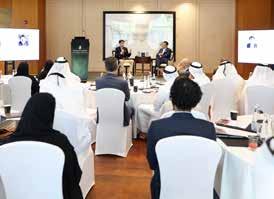
in Dubai. The centre aims to develop this vital sector and enhance its economic contribution in line with Dubai’s future development plans. It works closely with partners from both the public and private sectors and provides comprehensive support to all family businesses operating in Dubai.

Royal Air Maroc now offers three direct flights per week between Casablanca, (CMN) and Beijing (PKX), starting 20th January 2025
It also opens up a pioneering China-Morocco-Brazil link, establishing Morocco’s Casablanca as a global cargo hub
n With its first flight from Casablanca (CMN), Morocco, to Beijing’s Daxing International Airport (PKX), on 20th January 2025, Africa’s leading cargo airline, Royal Air Maroc Cargo, has reinstated an essential Sino-Moroccan trade link. On Mondays, Thursdays, and Saturdays, a Boeing 787-9 will link the two cities, offering a weekly cargo uplift of approximately 30 tons each way. The three return flights to Casablanca will operate on Tuesdays, Fridays, and Sundays. These scheduled, direct flights in both directions will ensure fast transit times for cargo customers, offer complete tracking transparency, and enable them to plan long term transport solutions.
“For many centuries, Morocco’s geographical location has rendered it the perfect gateway for shipping trade to Africa and Europe,” says Mr. Yassine Berrada, VP Cargo at Royal Air Maroc. “At Royal Air Maroc, we are proud to go even further, building Casablanca up as a true air bridge between Asia, Africa, and the Americas. Our newly launched, thrice-weekly service out of China’s largest airport, not only provides a highly efficient service for
Chinese goods destined for Africa, but also offers a direct onward connection to Brazil, thanks to our recently commenced Sao Paolo (GRU) route.”
Royal Air Maroc enjoyed a successful business relationship with the Chinese market prior to the pandemic, with regular flights to Beijing. “Reinstating Chinese services was an obvious and natural decision as goods exchange is important,” Mr. Yassine Berrada explains. “We chose China’s largest airport in Beijing as our starting point, since demand is strongest here both in terms of passenger and cargo. In the future, we plan to expand connections to other major Chinese cities such as Shanghai and Guangzhou.”
In China, Royal Air Maroc is competently represented by Globe Air Cargo China, a subsidiary of ECS Group. The GSSA will be filling inbound Moroccan flights with Chinese goods such as: electricals, electronic equipment, furniture, lighting signs, prefabricated buildings, iron/ steel goods, knitted or crocheted fabrics, manmade filaments, toys, games, and sports equipment among other commodities.
Many of these will enjoy direct onforwarding to Brazil via Morocco, on board Royal Air Maroc’s recently launched CMN-GRU flights. In addition, ECS Group will provide robust technological support using its proprietary solutions and enabling access to CargoTech’s comprehensive suite of digital tools. These advanced platforms, covering revenue management, e-booking, and capacity optimization, will enhance Royal Air Maroc’s operational efficiency, maximize its cargo potential and market reach through data-driven insights.
Adrien Thominet, Executive Chairman of ECS Group stated: “We are incredibly proud to support Royal Air Maroc in establishing this vital link between China and Morocco. Our dedicated teams at Globe Air Cargo China are committed to ensuring the success of this route by optimizing cargo flows and leveraging our advanced digital solutions. By combining our expertise with Royal Air Maroc’s ambitious vision, we are helping to build efficient and sustainable air freight solutions that drive economic growth and connectivity across continents.”
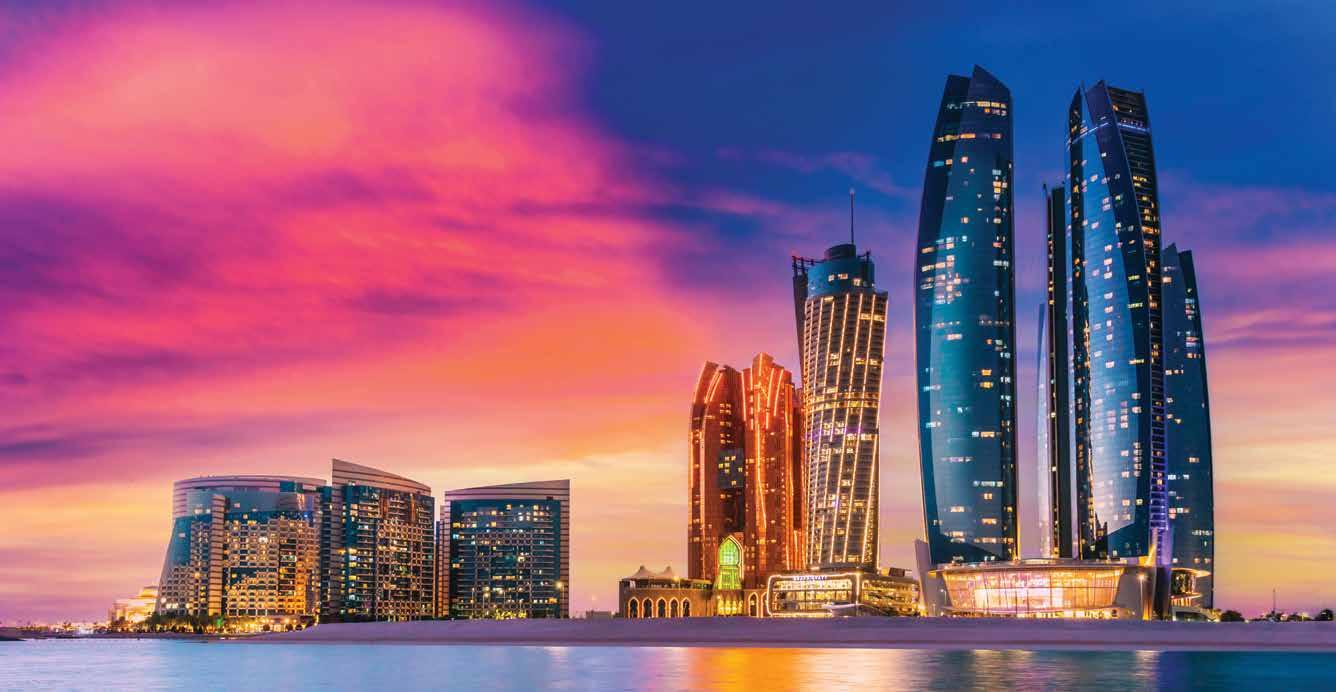










n SAL Saudi Logistics Services, the leading provider of cargo handling and logistics solutions in the Kingdom, has signed a partnership agreement with the King Salman Humanitarian Aid and Relief Center (KSRelief) to provide integrated logistics services in support of the center’s efforts to deliver humanitarian aid quickly and efficiently to the most in-need regions worldwide.
The agreement was signed by Eng. Thunayyan Al-Thunayyan, CEO of SAL Logistics Sector at SAL Saudi Logistics Services, and Dr. Salah Al-Mazrou, General Supervisor of Financial and Administrative Affairs at KSRelief, in the presence of executives from both parties.
This partnership reflects SAL’s commitment to leveraging its expertise and advanced logistics capabilities to ensure the swift and effective delivery of humanitarian aid to remote and affected areas. The agreement further strengthens SAL’s role in supporting KSRelief’s relief operations, facilitating transportation, storage, and customs clearance processes to ensure aid reaches its intended destinations on time.
Commenting on the partnership, Eng. Thunayyan Al-Thunayyan expressed SAL’s pride in this collaboration, stating: “Our
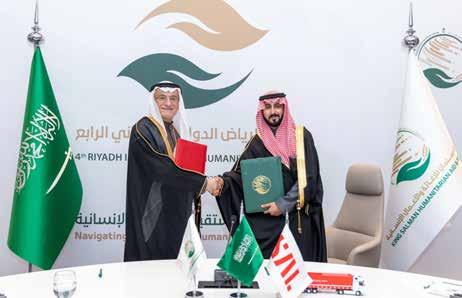
ability to reach remote and affected areas and our collaboration with KSRelief is a great honor and source of pride for us. This ensures the fulfillment of logistics requirements that contribute to the delivery of aid to those in need, relying on our expertise in designing integrated logistics solutions.”
This agreement underscores the pivotal
role SAL Saudi Logistics Services plays in providing logistics support for global humanitarian efforts and strengthening cooperation with various public and private entities. It aligns with Saudi Vision 2030, which aims to position the Kingdom as a leading global logistics hub and reinforce the logistics sector as a key pillar of the national economy.
n SharpEagle, a global leader in industrial safety solutions, proudly highlights its robust presence in the Forklift Safety Light Market, as reported in the latest Prospect Research Reports study. The comprehensive analysis reflects SharpEagle’s dedication to enhancing workplace safety through highperformance and reliable safety lighting products for material handling operations.
The report underscores the increasing demand for forklift safety lights, driven by heightened workplace safety regulations and the need for operational efficiency in warehouses, Mining, Manufacturing, and logistics hubs. SharpEagle addresses these demands by delivering advanced safety solutions designed to safeguard workers and optimise workflows.
Key features of SharpEagle Forklift safety lights:
Powerful LED Illumination: Ensures clear and visible warnings to reduce the risk of accidents and collisions.
Durable Construction: Engineered to endure tough industrial environments, ensuring long-lasting performance.
Customisable Designs: Offers various beam configurations and colour options to meet diverse operational requirements.
Energy-Efficient Technology: Combines superior illumination with low power consumption for sustainable operations.
“As businesses prioritize safety and efficiency, SharpEagle remains focused on delivering high-quality safety solutions that make a real difference. Being recognised in the market report underscores our commitment to creating safer work environments for industries.
The report projects significant growth

in the forklift safety light market, fueled by increased automation and the adoption of safety technologies. With its emphasis on innovation and customer-centric design, SharpEagle is well-equipped to meet the evolving needs of the industry.
SharpEagle empowers businesses to minimise risks, enhance productivity, and comply with industry safety standards by offering dependable and effective safety solutions.


Guillaume Crozier, dnata’s Chief Cargo Officer has over 20 years of experience in the cargo and logistics industry and has been with dnata for over 14 years.
Before his current role, Crozier served as Senior Vice President, Cargo, UAE, and Head of Global Cargo Strategy for over three years. He led the strategic direction and transformation of dnata’s cargo business, overseeing a team of over 3,000 employees. He has also served as Chief Operating Officer of dnata Switzerland. In conversation with Global Supply Chain Editor, Abigail Mathias, we discover how he juggles professional and personal roles.
Abigail Mathias: What’s your typical day like?
Guillaume Crozier: During the week, I wake up at 05.30 am, make myself a cup of coffee, before jumping in the shower. It’s then time to wake up my children and get to the office. Once the working day is over, it’s time to work out or do some running, before dinner. The children could have piano lessons, while I do a bit more work before bed.
AM: Are you a coffee or tea person? If so, how many cups a day?
GC: Coffee. One first thing in the morning helps to get me started, but I try to limit it to 2-3 per day, focusing more on keeping hydrated with water.
AM: What do you do to keep yourself fit?
GC: Working out, and running a couple of times per week.
AM: What time do you break for lunch?
GC: 12:00 pm
AM: Around what time of day do you wrap up work at the office?

in the evening?
GC: Playing sport, playing with my kids whenever they’re at home, including helping them learn musical instruments.
AM: When and to which location is your next holiday?
GC: Next one will be to France for a skiing holiday, and gathering the family together.
GC: It all depends on the week and any projects we’re working on, or situations that may arise as we’re a 24/7 business. However, generally it’s 5 pm, but I keep going later at home, connecting with the network, when required.
AM: What advice would you’d give other business professionals juggling time?
GC: Drink plenty of water, manage your sleep, and ensure you make time for exercise. Then you can cope with any schedule.
AM: To me and our association Global Supply Chain Magazine is…
GC: A good source of information and channel to communicate with the industry.
AM: When do you catch up on world/business events?
GC: The working day is always a busy time with meetings, planning and coordinating with global colleagues. It’s also important to unwind in the evening, so I try to fit in the latest news and events around that whenever I can.
